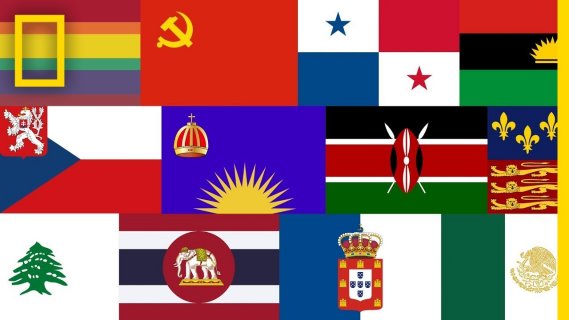
All flag images from the World Flag Database
Index of International Releases by Country

All flag images from the World Flag Database
![]() - used with thanks
- used with thanks
[Home] [The Official
Rarities Yearly Lists] [Traveling Wilburys]
[Online Performances (bobdylan.com)] [Online Performances (Other)] [Interviews with Bob] [VHS
& DVD]
[International Mono Releases] [International Stereo Releases]
[Questionable
Releases] [Released Rarities] [Honourable
Mentions]
[News] [Red Herrings] [Trading] [Other Pages]
This page is at the moment still a work in progress! Its purpose is to include country-specific information that would otherwise have to be repeated on many album and singles pages, and also highlight unusual country releases such as for Algeria and Angola, where only one Dylan release has so far been identified. Countries like the USA, Canada, the UK and many European countries have released every Dylan album, so for those countries I shall just list exclusive releases. The number of countries where Sony Music manufactures albums is now greatly reduced, for example all European CDs were sourced for many years from Austria, not pressed locally anymore as vinyl used to be. (They now seem to be manufactured in Germany.) The resurgence of vinyl means that records are now sourced from France (MPO), Holland (Music On Vinyl) and also Germany.
NORTH AMERICA
Matrix Numbers:
Gerd Rundel found the following information re Columbia US first pressings at the Analog Planet web-site from former Columbia engineer Phil Brown: "Columbia Records would often cut six (or more) lacquers at the same time for high demand records. Multiple lacquers would be cut and sent to various pressing plants so that they could have more than one plant pressing the records at the same time. Columbia used XSM, MAL, XLP, and consecutive numbers for each side, or PAL and PBL prefixes for sides 1 and 2 of their albums. The coding of the lacquers with letters allowed the lacquers to be assigned to different pressing plants. A and B suffixes for the Santa Maria, CA, pressing plant, C and D for Terra Haute, IN, and E and F for Pitman, NJ. Six (or more) sets of lacquers were usually cut for any big-name artist, so the very first mastering would be 1A, 1B, 1C, 1D, 1E, and 1F. This changed over the years (pressing plants opened or closed), so A and E lacquers were known to be sent to the Terra Haute, IN, pressing plant, B and D lacquers to the Pitman, NJ, pressing plant, C lacquers were sent to the Santa Maria, CA, pressing plant, and G and H were sent to the Carrollton, GA, plant. Thus a record with a 1A in the matrix could easily have been pressed at the same time as a record with a 1H in the matrix. They were just pressed at different pressing plants. Letters M and N were brought into use in the 1980s." There are so many matrix number variations amongst 1960s US Dylan albums that it is impossible for every combination to be listed on the mono and stereo album pages!
Sleeve Construction:
US and Canadian album sleeves (called "jackets" in the USA) were usually much heavier than European sleeves because they were made of thick buff card with the album artwork printed on a white sheet of paper called a slick and pasted on to the sleeve. Re US and Canadian mono and stereo vinyl releases, Robert Kornovich says "I was recently looking through my collection of Dylan records from the 1960s, specifically US and Canadian pressings, and noticed that the front sleeve slicks are exactly the same for the stereo and mono pressings. It appears that when pasting on a stereo cover slick, they made sure that the stereo markings at the very top are visible on the front by wrapping the excess at the bottom of the slick around to the back of the cover. For the mono album they pasted the slick so that the very top with the stereo markings wraps around to the other side of the cover and is eventually covered up when the back slick is pasted on. I had a few mono copies of Freewheelin' and Highway 61 Revisited that are in rather poor shape, so I peeled the slicks off of the back to confirm that the stereo markings are there, wrapped around to the other side. Some of my better mono copies have the stereo markings slightly visible through the back slick. This appears to be the case for all albums prior to Blonde On Blonde, and was no longer the case for any pressings done after the early 1970s."
Columbia US Catalogue number prefixes:
AS - 12" promotional issue (1975-1984)
ASQ - quadraphonic promotional issue
C [with barcode on cover] - $5.98 list price (1983 onwards)
CS - 1962 to early 1970s
FC - $8.98 list price (1978-1989)
HC - Columbia Records Master Sound issue (1981-1982)
JC - $7.98 list price (1973-1982), $8.98 list price (1983-?)
KC - 1973
KCS - early to mid 1970s
OC - $10.98 list price (1986-1989)
PC [with no barcode on cover] - $6.98 list price (1973-1980)
PC [with barcode on cover] - $5.98 list price (1980-1989)
PCQ - quadraphonic issue
QC - $8.98 list price (1983-1986)
TC - $8.98 (1981-1983) later used for cassettes
Printer and label identification:
Based on the Spizer book, then:
"2" indicated that the jacket was fabricated by Imperial Paper Box Corp. of Brooklyn, NY;
"4" indicated that Imperial Packing Co., Inc. of Indianapolis, IN, fabricated that particular sleeve, and
"8" was by Modern Album Finishing Co., probably at Terre Haute, IN. (Modern Album also had record jacket fabricating plants in New York, Los Angeles, CA, Newark, NJ, and Nashville, TN.)
In cases of reissues, Columbia would substitute their own pressing plant symbols for the various numbers from the different sleeve fabricators they used in the past. Imperial Paper sleeves were even-numbered (2, 4, 6, 8) whilst Modern Album-fabricated sleeves were odd numbered (1, 3, 5, 7, 9).
By the late 1960s Columbia began fabricating their own sleeves, with a heart symbol for Pitman, NJ; "A" for Terre Haute; "S" (whether straight or big blocky bold) for Santa Maria, CA." (Some 1970s sleeves also have what looks like a "B", I do not yet know where these were made. If it's actually an "8", they're renumbered sleeves originally printed by Imperial Paper.)
Label styles:
|
Terre Haute, IN |
These are the four Columbia US "6 eye" stereo record label variants for Bob Dylan with sources identified by the Spizer book. |
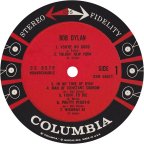 Hollywood, CA (with Bert-Co typesetting) |
CD information:
The "DIDP" number (Digital Identification Popular) is a code used by Sony DADC (Digital Audio Disc Corporation) on CDs pressed in Terre Haute, IN, or one of their other CD plants in the USA, from 1983 onwards (Classical CDs had "DIDC"). If it's not present on a US Columbia CD, that probably means that it was either manufactured by Sony in Japan, or at another US CD pressing plant under contract from Columbia.
Columbia Record Club (USA):
Manuel García Jara says: "Columbia Record Club was formed in Aug 1955 by Columbia Records as an experiment to market music directly by mail, spurring sales to rural consumers. This club offered to subscribers standard and exclusive releases in LP and in 7" formats. LPs often had picture sleeves but sometimes they came in generic sleeves. Labels had different designs through the years. Some of them include Dylan tracks (e.g. 80 Biggest Hits By The Stars Who Made Them Famous, Disco Teen '65 or Disco Teen '66). From 1968, LPs of Columbia Record Club had a new design with the text "A Columbia Musical Treasury", but there were no albums with Dylan tracks.
Until 1965, singles and EPs released by this club were exclusive records, very collectable and beautifully packed: see scans of a 2-EP set released in 1964 with the text "Columbia Record Club - Terre Haute, Indiana". In the period 1965-1966, were released also commercial standard items, but they had exclusive sleeves with the text "Another great single from the Columbia Record Club". Apart from "Like A Rolling Stone", I've got also editions of "Positively 4th Street" and "Rainy Day Women" with these sleeves. From 1967 until 1974, Columbia Record Club released again only exclusive singles & EPs; from 1967 until 1971, in the "The Super Set" series with no Dylan contents, and from 1972 until 1974, in the "Playback" series including inserts with a feedback system. There were two variants of sleeves and design of record labels: in 1972, the sleeve has seven occurrences of "Playback" on front and seven or six on rear, and labels are yellow: there is only one EP with Dylan content; in the period 1973-74 there was a new design of sleeve and of labels."
The growth of the record club lead to the formation of CBS Direct Marketing Services in 1966, under which Columbia Record Club operated until 1971 when CBS Direct Marketing Services was renamed Columbia House. Columbia Record Club continued to operate as a branch of Columbia House until gradually being phased out, and by the late 1970s was completely absorbed into Columbia House and ceased to exist.
US Pressing Plant Codes:
Pressing plant codes used for Warner, Elektra, Atlantic and Asylum records:
AR: Allied Record Company. Los Angeles, California
BW: Bestway Plastics. Mountainside, New Jersey
CP: Columbia Records. Pitman. New Jersey
CSM: Columbia Records. Santa María, California
CT or CTH: Columbia Records. Terre Haute, Indiana
LY: Shelly Products. Huntington Station, New York
MO or MON: Monarch Records. Los Angeles, California
PL: Plastic Products, Memphis, Tennessee
PR: Presswell Records Company. Ancora, New Jersey
RCAH: RCA Records. Hollywood, California
RCAI: RCA Records. Indianapolis, Indiana
RI: Philips Recording Co. Richmond, Indiana
SP: Specialty Records Corp. Olyphant, Pennsylvania.
AFRTS releases:
These very rare radio station LPs from the United States Armed Forces Radio & Television Service (AFRTS) usually have a selection of songs from a Bob Dylan album on one side, and songs by another artist on the other, although there are some Various Artists albums. I have details of albums so far from 1969 to 1986. The Concert For Bangladesh [George Harrison & Guests], Bob Dylan's Greatest Hits Vol. II, Tribute To Woody Guthrie and Bob Dylan At Budokan have songs from the same multi-LP set on both sides. The albums came in buff AFRTS or plain sleeves.
This list of AFRTS albums with Dylan tracks may not be complete.
RL 47-9/TP-339 Various Artists compilation with I Threw It All Away from Nashville Skyline (1969)
RL 3-1/P-12045-46 Bob Dylan - Self Portrait/Johnny Rivers - Slim Slo Slider (1970)
RL 21-1/P-12291-92 Bob Dylan - New Morning/Tim Buckley - Starsailor (1970)
RL 28-2/P-13053-54 George Harrison & Friends - The Concert For Bangladesh (1972)
RL 31-2/P-13093-94 Bob Dylan's Greatest Hits Vol. II/Cat Stevens - Very Young And Early Songs (1972)
RL 9-4/P-14123-24 Bob Dylan - Pat Garrett & Billy The Kid/Various Artists - Oklahoma Crude OST (1973)
RL 28-4/P-14359-60 Bob Dylan - Dylan/Rory Gallagher - Tattoo (1973)
RL 34-4/P-14435-36 Bob Dylan/The Band - Planet Waves/Joni Mitchell - Court And Spark (1974)
RL 29-4/P-14495-96 Aretha Franklin - Let Me In Your Life/Bob Dylan - Bob Dylan's Greatest Hits Vol. II (1974)
RL 34-5/P-15107-08 Bob Dylan - Blood On The Tracks/David Gates - Never Let Her Go (1975)
RL 5-76/P-15787-88 Bob Dylan - Desire/Chris Squire - Fish Out Of Water (1976)
RL 41-6/P-16315-16 Bob Dylan - Hard Rain/Bryan Ferry - Let's Stick Together (1976)
RL 4-7/P-16541-42 Various Artists - Tribute To Woody Guthrie (1976)
RL 21-9/P-18371-72 Bob Dylan At Budokan (1978)
RL 39-9/P-18647-48 Bob Dylan - Slow Train Coming/Van
Morrison - Into The Music (1979)
This is the second AFRTS album with tracks from
Slow Train Coming
- P-18626 (probably a Various Artists compilation) included Gotta Serve
Somebody, scans required!
RL 38-1/P-20159-60 Bob Dylan - Shot Of Love/Art Garfunkel - Scissors Cut (1981)
RL 25-6/P-23639-40 Bachman
Turner Overdrive - Live! Live! Live!/Various
Artists - Band Of The Hand Motion Picture Soundtrack
(1986)
Side 2 has Bob with Tom Petty & The Heartbreakers on the film's title track.
Stickers etc. used on Front Sleeves of Export Copies:
Stickers etc. used on Rear Sleeves of Export Copies:

Columbia CL 1986
(USA for export) - detail of rear with three instances of "Columbia"
whitened out, faded blue address stamp and "6" on right, scan by Gerd Rundel

Columbia PC 8579 (USA for export) -
detail of rear, scan by Lars M. Banke ("Columbia" name obscured twice)

Columbia KCS/JC 8786 (USA for export) -
detail of rear, scan by Lars M. Banke (two instances of
Columbia names blacked out)

Columbia CL 2328 (USA for export) - detail of rear
with two instances of "Columbia" covered with "CBS" stickers, scan by Gerd
Rundel

Columbia PC 32747
(USA for export) - detail of rear with "Columbia" obscured by
two "CBS" stickers, scan by Gerd
Rundel
Stickers etc. used on Record Labels of Export Copies:
Columbia Inner Sleeves:
Fake Singles Sleeves:
|
|
Like the unauthorised sleeves below
from Portugal and Mexico, the USA has its own fake sleeve sellers! One of
these sleeves was even listed (as a joke!) on bobdylan.com... The fake sleeve used for Columbia 4-43592 even has the EMI Columbia logo as then used in the UK at top right, not a genuine US Columbia logo! It also has "Pledding My Time" instead of Pledging my Time! These singles are listed in Questionable Releases (Official Dylan Singles). |
|
||
|
|
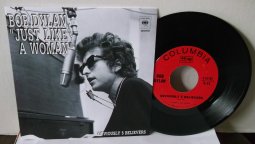 Columbia 4-43792 (USA) - B-side with fake sleeve, picture fr1om eBay |
|
||
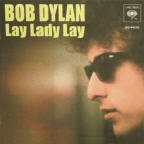 Columbia JBS 44926 (USA) - front of fake sleeve, photo from eBay |
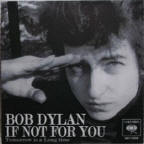 Columbia AE7-1039 (USA) - front photo from eBay |
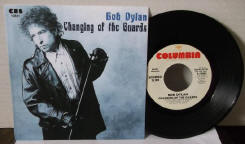 Columbia 3-10851 (US promo) - A-side with fake sleeve picture from eBay |
|
|
CD Manufacturing Codes
From Discogs.com:
DID_ codes are the numbers used by Sony's manufacturing company, Digital Audio Disc Corporation, to identify the master copies of CDs duplicated in their pressing plants. DADC has used a number of different DID_ code series over the years:
* DIDC - Classical recordings released on
Sony-affiliated record labels.
* DIDP - Popular (i.e. non-classical) recordings released
on Sony-affiliated record labels.
* DIDX - Recordings pressed by DADC released on non-Sony-affiliated
record labels.
* DIDY - Recordings pressed by the US division of DADC for the Columbia House
Record Club.
* DIDZ - Recordings released on WEA Japan. (This code was only used from 1983 to
1985.)
A DID_ code on a release doesn't necessarily mean that copy of the release was actually pressed by DADC. As more CD pressing plants opened around the world, the record labels would often have other manufacturers press later runs of releases originally manufactured by DADC, but wouldn't necessarily remove the DADC mastering code from the CD's packaging. In some cases the DIDX codes also appear in the matrix codes of CDs manufactured by other companies.
US Columbia Dylan CDs have "DIDP" codes. Six examples are shown below.


CANADA before 1965 CANADA
after 1965
Columbia Records of Canada opened a pressing plant at Don Mills, Toronto, Ontario, in 1971, which operated until 1988. This means all Dylan records sold in Canada before 1971 were pressed in the USA. They have "PRINTED IN CAN." at the bottom of the record labels, but this can only refer to the labels themselves. The blank records must have been imported into Canada and then have had the Canadian labels affixed. Most Canadian sleeves usually are identical to US sleeves apart from having "LITHO IN CANADA" on the front or spine, with "PRINTED IN U.S.A." missing from the rear sleeve. Other Canadian sleeves have the printer name of Shorepak Canada.
Columbia Records of Canada Ltd. was renamed CBS Records Canada Ltd. in late 1976. This is reflected in the different text on Columbia album sleeves and record labels. Hard Rain was released by Columbia Records of Canada in Sep 1976, so Street-Legal must be the first Canadian Dylan album to be released by CBS Records Canada Ltd.

Columbia PG 31120 (Canada) - detail of rear of gatefold sleeve, scan by
Gerd Rundel (early 1970s release - "COLUMBIA RECORDS OF CANADA LTD.",
Don Mills address)

Columbia PG 31120 (Canada) - detail of rear, scan by Lars M. Banke
(mid-1970s release - "CBS RECORDS CANADA LTD.", Don Mills address)
During the 1960s, 1970s and early 1980s many Columbia Canada as well as Columbia US albums were exported to Europe and elsewhere but had to have all instances of "Columbia" covered over and replaced by "CBS" for copyright reasons.
Stickers etc. used on Front Sleeves of Export Copies:
Stickers etc. used on Rear Sleeves of Export Copies:

Columbia KCS 8579 (Canada for export) - detail of rear with two Columbia
names obscured, scan by Lars M. Banke

Columbia KCS 8905 (Canada for export) - detail of rear with "Columbia"
name obscured, scan by Lars M. Banke

Columbia XFC 36553 (Canada for export) - detail of rear, scan by Lars M.
Banke ("Columbia" covered with silver sticker)
Stickers etc. used on Record Labels of Export Copies:
EUROPE
"LC|0149" was a Label Code issued by the IFPI (International Federation of the Phonographic Industry) from the mid-1970s and represented CBS Records. "LC|0162", used after 1991, represents Columbia Records.
 |
A new Sony Music logo was introduced outside North America in 2009. The "apostrophe" logo on the left can be white or red, but "SONY MUSIC" is always in white. |
 |
UK sleeves were usually made of designs printed on white card (thinner than the buff card used for North American sleeves). They came in four different designs:
Three rear folded-over flaps: the rear sleeve was a separate piece of card (usually not laminated while the front would be laminated); the front sleeve had three flaps which were folded over the rear and glued down. This is the earliest design.
Two rear folded-over flaps: the front and rear sleeve were the same piece of folded card with two flaps on the front that folded over the rear at top and bottom and were glued down. If the front was laminated and the back not, the line on the back where the lamination ended could look like a third flap.
Three rear folded-under flaps: the rear sleeve was a separate piece of card (again usually not laminated while the front would be laminated); the front sleeve had three flaps which were this time folded over and the rear sleeve was glued to it. I have only one example of this.
Two rear folded-under flaps: the front and rear sleeve were again the same piece of folded card with two folded-under flaps on the rear at top and bottom. This is the latest design used until vinyl was mostly phased out in the 1990s, and again today in the vinyl revival.
Manuel García Jara says: "Before 1962 Columbia records from the USA were released in the UK by Philips (who later became PolyGram, and are now part of Universal) on either the Philips or Fontana labels. CBS records were pressed by Philips from their launch as a separate label in 1962 and CBS didn't own pressing facilities until they bought Oriole Records in 1964. Oriole had its own pressing plants at Aston Clinton and Colnbrook*, kept busy by the weekly Embassy titles for Woolworths, well over half their output. Oriole had also released American Columbia hits in the UK in the early 1960s. The pressing plants made the company an attractive proposition, and US giant CBS was seeking its own pressing facility instead of relying on its partnership with Philips. Oriole came to an end in September 1964 when the company was bought up by CBS on 21 Sep 1964 and most of the catalogue ceased, but Oriole singles continued to be issued until November 1965. Oriole LPs were thicker than average, and all the early Motown LPs in Britain were on Oriole-American and collectability is enhanced by the heavy vinyl. CBS continued with both the Oriole Embassy and Realm labels for some years. CBS records were released in the UK up to 1991, when they became Columbia. Up until this time the UK Columbia record label was part of EMI, with no link to the US Columbia label, as it was everywhere in the world except North America." Ronald Born adds: "There's an easy way to identify Philips-made CBS LPs. The inner pressing ring is deeper and about 22mm while CBS pressings have a ring of about 32mm. Probably all Philips pressings have this upside down triangle as a part of the matrix numbers. Another Side of Bob Dylan was the last UK CBS LP (of any artist, not just Dylan) made by Philips first." Philips pressings exist for both Bringing It All Back Home and Highway 61 Revisited, but these were made to meet extra demand, not pressed by Philips first.
*Although Wikipedia and several other sources say that Oriole had a pressing plant at Colnbrook, other sources say that the Oriole premises there were just a distribution warehouse, with possibly some recording and editing facilities, but not a pressing plant.
Because of the huge variations in record labels from 1962 to the 1990s, the UK may be the most prolific country for Dylan releases, even including the USA with its much larger number of processing plants. For a detailed discussion of Dylan UK record label designs, see CBS UK Record Labels.
The CBS Records London address was 104 New Bond Street, London W1, from 1964 to 1967. Sleeves before 1967 didn't have a postal address. The company was then at 28/30 Theobalds Road, London WC1 (WC1X 8PB from early 1970) between 1967 and late 1973 - the inner sleeves from my original CBS UK copies of Pat Garrett & Billy The Kid (Jul 1973) and Dylan (Nov 1973) still have the Theobald Road address. Between 1974 and 1975 the address was CBS Records, 17/18 Soho Square, London W1B 5PD. Between 1975 and 1983 the address was CBS Records, 17/19 Soho Square, London W1V 6HE.
CBS catalogue number prefixes:
40- stereo cassette releases
42- stereo 8-track tape cartridge releases
CQ- SQ Quadraphonic releases
CAQ - Q8 Quadraphonic 8-track tape cartridge releases
Albums Exclusive to UK
The front sleeve of the UK release of Shot Of Love above right is immediately noticeable as different from the US album - the US album title is in white lettering, whereas the UK sleeve has the title in black as per a rejected front design. Hans Seegers informs me the UK was the only country in the world where this sleeve variation was used!
CBS UK Printers
 Bob Dylan - Garrod & Lofthouse Ltd. |
||
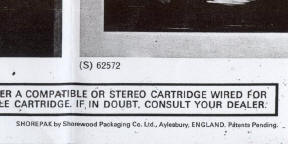 Bob Dylan's Greatest Hits - Shorewood Packaging Co. Ltd. |
 Nashville Skyline - the Upton Printing Group |
 Nashville Skyline - Quality Stationery Limited |
Many UK albums do not have printer's names on the rear sleeve, but CBS UK used at least six different named British printers at different times, sometimes more than one printer for the same album. In the 1970s some albums and singles had sleeves printed in the Netherlands.
CBS UK LP Inner Sleeves
CBS UK started using plain paper sleeves around 1974, so these informative printed sleeves were discontinued, although there are some examples from the 1980s when the "Nice Price" range was introduced for reissue LPs. Apart from Bob Dylan At Budokan, where the records had plain paper sleeves, UK Dylan albums from Street-Legal onwards through the 1980s to Oh Mercy had album-specific picture inner sleeves (not shown), after which plain paper sleeves were predominant.
CBS UK Fake 7" Single Sleeves
CBS UK Fake Acetates
These three discs belonged to a departed US collector who had in the past contributed to my web-site. Before his death he sold off most of his collection through Heritage Auctions, Dallas, TX, but there were some that Heritage wouldn't sell because they didn't think they were authentic. His son is now selling these on eBay and these are three of them. I have no doubt that the original owner bought them in good faith and believed them to be genuine. The seller claims they come from aborted first recording sessions for Oh Mercy in the UK with Ronnie Wood, but I haven't found any evidence such sessions ever took place.
PDO UK Discs and CD "Bronzing"
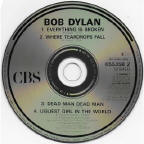 CBS 655358 2 (UK) - 1989 5" CD single (my copy, "MADE IN U.K. BY PDO", but not affected) |
Thanks to Jim Siddy for pointing out that the 1990 Unbelievable UK 5" CD single (see International Singles: Singles & EPs 1990-1999) was not as expected made in Austria, but in the UK by PDO (Philips & Dupont Optical) at their plant in Blackburn, Lancashire. Like Jim's copy, my copy of the CD today is discoloured by an effect called "bronzing", which occurs mainly in discs made by PDO in Blackburn between 1988 and 1993 because of a fault in their manufacturing process. PDO manufactured mostly budget and classical CDs for a large number of record companies including Ace Records, Decca and Deutsche Grammophon. Other PDO plants worldwide were not affected. Bronzing can make the disc unplayable but my copy still plays perfectly (this is just as well because PDO, now called EDC, Entertainment Distribution Company, stopped replacing defective CDs in 2006). |
||||
|
|
|
|
|
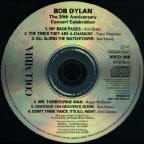 Columbia XPCD 308 (UK) - 1993 CD scan by Hans Seegers (also "MADE IN U.K. BY PDO", but possibly not affected) |
|
My copy of the Jan 1990 Political World UK CD single also made by PDO seems unaffected, while my 1991 "Dylan Originals" promo CD single is very badly discoloured, although it again plays OK. The 1993 30th Anniversary Concert Celebration UK CD single was also made by PDO, but later UK CD singles from 1994 onwards came from Austria. For the 1989 CBS UK CD single of Everything Is Broken, also made by PDO, see International Singles: Singles & EPs 1987-89. This again appears not to be affected. For the 1990 Forever Young promo compilation CD, which is affected, see International Releases (Dylan-Only Compilations) 1990s. These six CDs seem to be the only unique to the UK Dylan CDs made by PDO between 1989 and 1993.
7" & 12" Singles
Regular Dylan Albums:
All the 1960s and early 1970s albums shown here are therefore re-releases. Albums with catalogue numbers CBS 32xxx date from after 1982. All the record labels have "Record mfd. in Ireland" below the song titles, but some have earlier variants that still have "MADE IN ENGLAND" at the bottom of the labels.
The Irish release of Nashville Skyline, CBS S 63601, probably from the late 1970s, just has "Girl Of The North" on the Side 1 label, omitting "Country"!
Other Albums

GERMAN FEDERAL REPUBLIC - WEST GERMANY (1949-1990)/GERMANY (1990 onwards)
Shown on the right above is a CBS West Germany inner sleeve from 1966 with illustrations of eight current CBS albums on each side. At top right on the front is Bob Dylan's Greatest Hits, the unique compilation released in Holland in early 1966, and subsequently released in Germany. This sleeve was actually found with an early copy of The Freewheelin' Bob Dylan from the UK!
The last West German CBS vinyl release was New Morning in 1970, although Asylum Records issued German releases of Planet Waves and Before The Flood in 1974. After 1970 all CBS releases sold in Germany, even those intended exclusively for the German market, were imported from Holland.
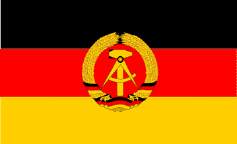
GERMAN DEMOCRATIC REPUBLIC - EAST GERMANY (1949-90)
The East German Intershop "hard currency" shops also sold Amiga-pressed releases of Bob Dylan At Budokan in Dutch sleeves but with record labels stating "MADE IN GERMANY". Infidels, Down In The Groove and Dylan And The Dead were also released in Dutch sleeves with East German pressed records, but the labels misleadingly say "MADE IN HOLLAND".
Blonde On Blonde was released in Holland as two separate LPs in stereo, and then no Dylan LPs were released there until 1967, when all the Dylan LPs from Bob Dylan onwards were released together in stereo. After John Wesley Harding in 1968, the twelve track UK version of Bob Dylan's Greatest Hits was released in Holland in 1969. After that Dutch vinyl releases were virtually the same as the UK until the early 1990s. Today all European Columbia/Sony Music vinyl releases are sourced from Holland.
Although it has the regular outside gatefold sleeve, the French Blonde On Blonde has a new inside without any of the usual photos. All the other rear sleeves are different from the usual worldwide rear sleeves.
The other detail scan, with "MADE IN ITALY BY CBS SUGAR S.p.A." in the circumference text, is from a stereo copy of Nashville Skyline.
The 1960s albums were made in Italy by CBS Italiana S.p.A. and distributed by Messaggerie Musicali, Milan. The sleeves were printed in Italy by Stampa Reparto Grafico C.G.D. CBS Italiana S.p.A was actually a subsidiary of Compagnia Generale Del Disco (C.G.D.), an Italian record company active between 1948 and 1988 founded by Teddy Reno, and acquired in 1959 by Sugar Music. In 1966 Sugar had a deal with CBS to distribute its catalogue in the Italian market, becoming CBS Sugar in 1970, which lasted until 1977.
Dylan Italian albums in the early 1970s were released by CBS Sugar, but by the late 1970s CBS had stopped using the Sugar name, even though "MADE IN ITALY BY CBS" on the record labels was still aligned as if "SUGAR" were present. Manuel García Jara says: CBS stopped releasing vinyl albums in Italy in the early 1980s, Real Live was probably the last Dylan vinyl album to be released in Italy. For this reason, Italian albums of the late 1980s with red CBS labels are very scarce and they were released only as parts of series, for example Blood On The Tracks from the series "Il Rock" (1988).Although there are many variants of the Spanish language in every Spanish speaking country, the conventional spelling system of the language is identical for all these countries, ruled by the Academies of the Spanish Language present in all those countries, from Mexico to the Philippines. Some translations of Dylan song titles into Spanish, especially in Latin American countries, are very eccentric!
Manuel adds: "Next Christmas will be published in Spain a very interesting book titled "Historia de la música grabada en España" (History of Recorded Music In Spain). I received today an advance copy, because of a lot of records shown in this book were taken from my father's collection. I tried to translate some comments which could be interesting for your site:
About CBS-Spain:
"In the period 1970-76, the way of thinking of this company was "Spain is a
limited market because of the economy, so the editions must be also limited".
This way of thinking became a peculiar way of working: each album was
released again and again in a small quantity of copies (500 to 3000) instead of
important editions (more than 10.000) as other companies did (EMI, Warner...)
So, each CBS album of this period (with the address Calle Princesa) is a treasure for
collectors".
Manuel adds: "You can find three different CBS addresses on Spanish records: "Calle Princesa 1, Madrid-13" (from the establishment of CBS here in January of 1970 until March of 1976), "Avenida del Generalísimo 25, Madrid-16" (from March of 1976 until November of 1980) and "Paseo de la Castellana 93, Madrid-16" (from November of 1980 until the end of CBS in Spain, mid 1990s). The last address later changed from "Madrid-16" to "28046-Madrid after a postcode change). However, CBS only changed its address once, not twice! After the Spanish Civil War, many places lost their original names "in honour of" Franco and his generals: there were everywhere (from big cities to small villages) streets, squares, avenues, colleges, hospitals... with his name and all its variants (Caudillo or Generalísimo). The Paseo de la Castellana (north of Madrid) was one of the most important and longest avenues of Madrid: part of this avenue retained its original name, but another part lost it in 1930 and the name was changed to Avenida del Generalísimo. When CBS moved to brand new offices in 1976, they were in Avenida del Generalísimo. However, after Franco died, many places returned to their original names: so, the third CBS address of "Paseo de la Castellana!" does not mean a change of location, only a change of name of the same street!"
About Dylan records:
"CBS-Spain did an important effort publishing in this
period all his 19 albums (from Bob Dylan to Hard Rain), and most of them
were reissued an half-dozen of times. The rarest albums of this period are the
first copies (with orange labels) of Blood On The Tracks and The Basement
Tapes of which only 100 copies were issued".
These Spanish records (with "Made in Spain" instead of "Fabricado en España", with Dutch sleeve and without SGAE logo) are a mystery to me. I always thought that records like this were made in Holland for the Spanish market, but I have got now some doubts. I am not absolutely sure but I suspect these records never were sold in Spain. Last July I was on the International Record Fair of Madrid and I met some other Dylan Spanish collectors. Obviously, we have talked about Dylan records and nobody has seen records "Made In Spain" anywhere in Spain. They always found their copies on EBay and, curiously, sellers always were from Holland or Germany. My father bought this copy of Blonde On Blonde as new record, not used (an important detail), in Rotterdam (Holland) in September of 1972. He bought all his records "Made in Spain" in different locations of Holland, except a copy of The Basement Tapes, in an UK sleeve, bought in Leeds in 1976. I know a CBS commercial agent and to create more confusion he says these records were pressed in Spain (a proof: look the mistake "Bob Dylan con Johnny Cash" on Nashville Skyline labels) and jacketed in Holland to be sold out of Spain. He added that selling records in Spain without SGAE logo was forbidden by Spanish laws for Protection of Artistic Ownership. (Dylan records released by Discophon on the 60s have not SGAE logo because CBS was still not established in Spain.) CBS released five Dylan albums in Spain in 1970, in this order: 1- Greatest Hits, 2- Nashville Skyline, 3- Self Portrait, 4- John Wesley Harding & 5- New Morning. Albums #1, 2 & 3 were made by Fonogram; #4 & 5 by COFASA.
Manuel adds: "The first Spanish editions of Bob Dylan's Greatest Hits, Nashville Skyline and Self Portrait were made by Fonogram, but the original editions of the rest of the albums, from Bob Dylan to Bob Dylan's Greatest Hits. Vol. II, were made by COFASA. According to J.B. Heinink, who worked at CBS at this time, the COFASA editions are the rarest and the best copies ever made in Spain: good pressing and excellent quality of sound: in the manufacturing process were used original matrices sent directly by Columbia from the USA.
The last Dylan album released by CBS itself in Spain was Under The Red Sky (1990). In 1991 CBS Spain became CBS/Sony and after early 1994 this company no longer manufactured vinyl. Records with red CBS/Sony labels are rare: they were made in limited quantities because most of people preferred to buy CDs. In this period (1991-1994) only four Dylan new albums were released by this company: The Bootleg Series Vol. 1-3 (1991), Good As I Been To You (1992), The 30th Anniversary Concert Celebration (1993) and World Gone Wrong (1993). However, CBS/Sony also reissued all the previous Dylan albums from Bob Dylan to Under The Red Sky, except Biograph but including Planet Waves and Before The Flood. So, there are 40 Dylan Spanish albums with red CBS/Sony labels... plus two or even three different variants of several albums (black/white logo, sleeve variants)."
These are the Dylan albums that had problems with the censorship:
John Wesley Harding (Discophon edition, 1968) . All tracks were authorised, but "The Three Kings" text was censored as "obscene" (!). The rear sleeve of this rare mono edition has a biography in Spanish instead of Bob's liner notes. Surprisingly, two years later the censors authorised the original text and this album was reissued in 1970 with the "Three Kings" notes.
Spanish albums with records made by Tecnodisco S.A.:
Discos CBS S.A. manufactured their own records up until the late 1980s, after which records were made for them by Tecnodisco S.A., also of Madrid. After the name change to CBS/Sony in 1991, the last records manufactured in Spain in the early 1990s were still made by Tecnodisco.
Albums made by CBS Spain for the Dutch market:
Manuel explains the mystery of records dating from 1973 with "MADE IN SPAIN" and "STEMRA" on the record labels, but with a sleeve printed in Holland.
Examples of these Spanish albums with album titles and song titles in English only, plus "MADE IN SPAIN" instead of "FABRICADO EN ESPAÑA" on the record labels. They all come in Dutch printed sleeves.
Spanish Printers:
Fake Spanish Sleeve:
Bob's early albums were prohibited in Portugal during the dictatorships of Dr. Antonio Salazar followed by Marcelo Caetano, which ended in 1974, so no mono LPs were released there. The regular albums were not released in Portugal until 1975. CBS releases in Portugal were made by Fábrica Portuguesa de Discos da Rádio Triunfo, abbreviated at first to just "F.P.D." and later as "Rádio Triunfo". Apart from regular Portuguese releases, Manuel García Jara has copies of Street-Legal, Slow Train, Saved, Shot Of Love and Infidels made in Spain to be exported to Portugal. The sleeves look the same as the Spanish releases but the record labels have "SPA" (Sociedade Portuguesa de Autores) instead of "SGAE" to the right of the centre hole. There is also a version of Bob Dylan At Budokan made in Spain with "SPA" on the record labels that Manuel knows about but has not yet tracked down. Although CBS was active in Portugal until the 1990s, the production of albums was decreasing there in the second half of the 1980s: the last Dylan album released in Portugal was Knocked Out Loaded (1987). Some Dylan records (e.g. More Bob Dylan's Greatest Hits) were reissued after this time, but no new Dylan albums were pressed in Portugal. Dylan albums sold in Portugal in the late 1980s/1990s were imported from Holland and also from Spain.
Portuguese 7" Single & EP Record Sleeves
These are all genuine CBS and Asylum Portuguese 7" singles and EPs from the 1960s to 1980s. If there are any missing please let me know.
Fake Portuguese 7" Single & EP Record Sleeves
Thanks to Sergio Mariano Romay, Manuel García Jara and Michel Pomarede for informing me about these fake Portuguese "promo" picture sleeves found on eBay. The records usually appear genuine but the sleeves are fake! (Although the "Portuguese" Unbelievable single is actually from Holland, not Portugal at all...)
These singles are listed in Questionable Releases (Official Dylan Singles).
For fake Mexican sleeves, see below.
Manuel García Jara says: "Music-box, the manufacturer and distributor of CBS in Greece, used to release records (especially singles) with some delay because it always waited to see how well records released in other countries, especially in Holland, sold. Then Music-box released singles with two tracks that were both A-sides in Holland, surely to make them more attractive to buyers.
Except for the first Dylan single ever released in Greece in the 1960s (CBS BA 301079 - Subterranean Homesick Blues with the usual B-side, She Belongs To Me), and the last single of the 1960s (CBS BA 301264 - Tonight I'll Be Staying Here With You with the usual B-side, Country Pie), Greek Dylan singles of this period always included two tracks originally released in Holland as A-sides. So, you can find:
Like A Rolling Stone/Positively 4th Street (CBS BA 301089)
I Want You /Rainy Day Women #12 & 35 (CBS BA 301111)
Leopard-Skin Pill-Box Hat/Just Like A Woman (CBS BA 301119)
I Threw It All Away/Lay Lady Lay (CBS BA 301258)
If a Greek single exists with Can You Please Crawl Out Your Window? (not yet found), the B-side would be One Of Us Must Know."
Bob Dylan CBS releases in Greece were limited during military rule (1967-74), and only allowed where the material was thought non-political. Unlike other CBS releases of the time, the records have dark-red labels rather than orange ones. Although these albums are official they were released during the Greek colonels' regime when Bob was banned in Greece and were therefore distributed "underground" by an Athens company called "Music-box". The sleeves were printed in Greece by Fotiadis & Ioannidis. "Music-box" is described as "Exclusive Representative of CBS Records in Greece", although on the 1973 Greek release of Nashville Skyline this reads "General Representative of CBS Records in Greece". The information on four sleeves is in English only, on the 1973 Greek release of Nashville Skyline it is given in English and Greek and the printer's name is missing.

CBS
SBPG 63601 (Greece) - detail of rear, scan by Manuel García Jara (1969 release -
"Exclusive Representative of CBS Records in Greece")

CBS
SBPG
63601 (Greece) - detail of rear, scan by Paul Prince (1973 release - "General
Representative of CBS Records in Greece", probably from a different printer)

CBS 66250 (Greece) -
detail of rear of gatefold sleeve, scan by Manuel García Jara (1970 release
- "Exclusive Representative of CBS Records in Greece")

CBS S 67239 (Greece) - detail of rear, scan by Manuel García Jara (1971
release - "Exclusive Representative of CBS Records in Greece")

CBS 69042 (Greece - detail of rear, scan by Hans Seegers (1973 release -
"Exclusive Representative of CBS Records in Greece")

CBS 69049 (Greece) - detail of rear, scan by Hans Seegers (1973 release - "Exclusive
Representative of CBS Records in Greece")

CBS 69097 (Greece) - detail of rear, scan by Manuel García Jara (1975 release
-
"Exclusive Representative of CBS Records in Greece",
this was probably the last Dylan release distributed by Music-box)
New Morning from 1970 was also distributed by Music-box and and also has "Exclusive Representative of CBS Records in Greece" on the rear sleeve.
The 1974 Greek releases of Planet Waves and Before The Flood were distributed by Lyra Records & Tapes of Athens and Thessalonica on behalf of Asylum Records, with records made in Greece by C.G.C.G. Ltd.
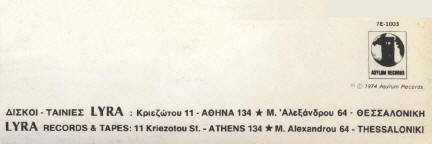
Asylum 7E-1003 (Greece) - detail of rear, scan by Gerd Rundel (1974)
However, four 1960s albums (Bob Dylan, Another Side Of Bob Dylan, Highway 61 Revisited and John Wesley Harding) can be found with CBS Greece sleeves as below with printer code "MT 49xx" but with Dutch 1967 or 1968 records with plain orange CBS labels. I suspect these albums were actually released much later than 1967, perhaps even around 1975 - confirmation required! Arie de Reus says that he was told by a Greek dealer that some Greek records were made in Greece but had Dutch labels. Of these four albums, the copies of Another Side Of Bob Dylan and John Wesley Harding have different matrix numbers from those of the Dutch releases with the same labels. This means that the records may have been sourced from Greece but given Dutch labels! The copies of The Freewheelin' Bob Dylan and Highway 61 Revisited have the same matrix numbers as those of the Dutch releases with the same labels. Lars M. Banke's mid-1970s Greek copy of The Freewheelin' Bob Dylan has Dutch labels, and the record also has the same matrix numbers as the 1975 Dutch release with the same labels.
After 1976 Dylan albums were distributed by Diski CBS A.E.B.E., starting with Desire (The Basement Tapes release was later). Further as regards albums, Lars M. Banke says: "I have a number of re-releases with red CBS labels, but – strangely not – regarding Another Side Of Bob Dylan, Subterranean Homesick Blues [Bringing It All Back Home], New Morning, Blood On The Tracks, Hard Rain and Bob Dylan At Budokan. Is this because these LPs haven’t been re-released with red CBS labels or is it simply because I haven’t (yet) been able to find copies?
Many Greek Dylan LPs have been re-released with a new catalogue numbers starting with 32xxxx. But I haven’t such re-releases regarding Highway 61 Revisited, John Wesley Harding, Self Portrait, Blood On The Tracks, Hard Rain and Bob Dylan At Budokan. Again the same questions as above are relevant to ask.
The Planet Waves album has been re-released by CBS in Greece, but not the Before the Flood album? At least I do not have a copy and I haven’t seen it listed anywhere.

CBS S 62429 (Greece) - detail of rear, scan by Lars M. Banke (mid-1970s release
- printer code "MT 4960")

CBS 66012 (Greece) - detail of inside of gatefold sleeve, scan by Manuel García Jara (mid-1970s
release - printer codes "MT 4968/69")
Several mid-1970s Diski CBS Greek releases had a printer code "MT 49xx" on the rear sleeve at bottom right (for Blonde On Blonde it was at bottom right on the inside of the gatefold sleeve). In this series of releases Bob Dylan was "MT 4957", The Freewheelin' Bob Dylan was "MT 4958", The Times They Are A-Changin' was "MT 4959", Another Side Of Bob Dylan was "MT 4960", Subterranean Homesick Blues [Bringing It All Back Home] was "MT 4961", Highway 61 Revisited was "MT 4962", Blonde On Blonde for some reason was "MT 4968/69" and John Wesley Harding was "MT 4963". John Wesley Harding appears to be the last album sleeve with an "MT" code.

CBS 62847 (Greece) - detail of rear, scan by
Hans Seegers (1976 release variant 1)

CBS 62847 (Greece) - detail of rear, scan by
Lars M. Banke (1976 release variant 2 with extra Greek text)
The 1976 release of Bob Dylan's Greatest Hits was the version with the 1967 UK front sleeve and tracklist, and there is no "MT" printer code on either of the sleeve variants shown.
SCANDINAVIA
Scandinavian 7” singles were all made at the PolyGram pressing plant in Oslo, Norway, while the sleeves were printed in the individual countries. Danish sleeves are plain white on the reverse and are of the pocket type open at the top. Norwegian sleeves are also of the pocket type, but this time the opening is on the left. The reverses are again plain white. In contrast, Swedish sleeves consist of a single sheet folded at the bottom with the same design on both sides once it's folded. As far as I know, no Dylan LPs were ever released in Scandinavia, albums were imported from the UK or Holland. However, there are many examples on this site of US and Canadian releases sold there with the "Columbia" logos obscured by stickers or marker pen (in Europe as detailed above the Columbia name was owned by EMI in most countries but by RCA in Spain).
Lars M. Banke adds regarding the sleeve of the 1973 Danish single: "The text means "The theme from TV's "Focus"". The story behind the single is that "Wigwam" was used as the signature tune or theme for a programme titled "Focus" broadcast by the Danish national television channel. And as there was only one national Danish channel when the single was released, there was no need to mention which channel on the sleeve - just "TV"." There are two alternate front sleeves for this single, one is smooth, the other is darker and rough.
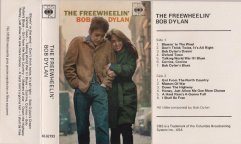 CBS 40-62193 (Denmark) - outside of cassette insert, picture from www.discogs.com |
The insert for this unique Danish cassette release looks the same as that of the early 1970s UK release, but the cassette was made in Denmark and also has the "NCB" logo of the Nordic copyright organisation. The cassette is off-white with pale buff CBS paper labels. Lars M. Banke has no knowledge of any other Danish cassette releases! |
 CBS 40-62193 (Denmark) - cassette Side 1 picture from www.discogs.com |
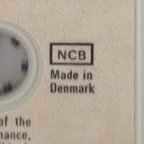 CBS 40-62193 (Denmark) - detail of cassette Side 1, picture from www.discogs.com ("NCB", "Made in Denmark") |
CBS 3323 was also sold in Denmark and Sweden. As far as I know, CBS 2476 was sold in Norway only. The 1969 Norwegian singles CBS 4219/CBS 4434/CBS 4611 were also sold in Denmark and Sweden, as was CBS 5122 (1970). The 1972 Norwegian single CBS 7688 was also sold in Denmark, Sweden had a separate release, see below.
 Polydor 516 242-2 (Norway) - front scan by Peter Oudejans (1993) |
This 1993 CD compilation
The Country Collection
exclusive to Norway
includes a Dylan rarity Heartland
(Bob Dylan/Willie Nelson) - Bob duets with Willie Nelson on this co-written song
from Willie's 1993 Columbia album Across The Borderline. Both
The Country Collection and Across The Borderline are listed
in
1993. There was also a Norwegian promo cassette of MTV Unplugged
in 1995, and these are the only Dylan releases from Norway I know about that
are not singles. Åge Aleksandersen released an album of Norwegian language cover versions called Fredløs: Dylan På Norsk [Outlaw: Dylan In Norwegian] in 1997. |
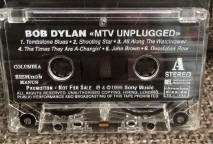 Columbia 478374 4 (Norway) - promo cassette Side 1 photo from eBay (1995) |
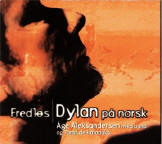 Kirkelig Kulturverksted FXCD 183 (Norway) - front of digipak, scan by Jack from Canada (1997) |
Columbia COL 498540 2 (Sweden) - front with sticker (my
copy, 2000)
This Sweden-only 2CD 32-track collection commemorated Dylan's Royal Swedish Academy of Music Polar Music Prize in 2000.
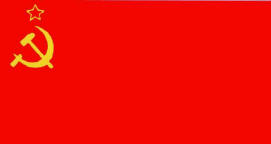
USSR (up to 1991)
RUSSIAN FEDERATION (after 1991)
CZECHOSLOVAKIA (up to 1992)/CZECH REPUBLIC (after 1992)
The national flag of the Czech Republic is the same as the former national
flag of Czechoslovakia.
The 2015 Polydor release of Eric Clapton's 1976 album No Reason To Cry, containing Bob performing on his composition Sign Language, is the only release I currently have from the now Czech Republic. The 1979 Supraphon album Eric Clapton is the same 1976 album with a new title and artwork.
I know of no Slovak releases from 1992 onwards.
Polish releases from the 1980s onwards will be added here.
The release sequence of Yugoslav albums is determined by the "ULS" number, the authorisation given by the Government (similar to "Depósito Legal" on Spanish record labels). Dylan from 1974 has "ULS-84", Planet Waves has "ULS-98", Before The Flood has "ULS-141", The Basement Tapes has "ULS-198" and Desire has "ULS-222". For some reason Blood On The Tracks was not released in Yugoslavia.
The records were initially pressed by Jugoton of Zagreb (now Croatia), which was a chain of record stores as well as a record company. Record labels from before 1976 have the logo of the "SAKOJ" Yugoslavian copyright organisation. The artists' organisation "SAKOJ" (Union of Composers of Yugoslavia) became "SOKOJ" (Federation of Organisations of Composers of Yugoslavia) in 1976, which appears on the labels of Dylan releases after that date. Records from the late 1970s were pressed by Helidon of Ljubljana (now Slovenia). Oh Mercy in 1989 and Under The Red Sky in 1990 were made by RTVL of Ljubljana, but these records were again pressed by Jugoton. No Dylan records have been released since 1990 in Yugoslavia or any of the countries which make up the former Yugoslavia.
According to one web-site "Silver" meant 25,000 copies sold in Yugoslavia and "Gold" meant 50,000 copies, although other sources say "Gold" meant only 25,000 copies. The only two Yugoslav Dylan sleeves I have with stars so far are Street-Legal and Desire.
MIDDLE EAST
Vinyl Releases
Cassette Releases

IRAN up to 1979
IRAN after 1979
 CBS 40-62847 (Iran) - outside of cassette insert scan by Manuel García Jara |
This mid-1970s release, from before the Iranian Revolution in 1979, is
the only official Iranian CBS release I have so far. The insert is the same
as the 1974 Dutch release with the same catalogue number, while the cassette
has Iranian (Farsi) text, and was probably made in Iran. There are several
unofficial Iranian releases listed in
Questionable Releases, all dating from
before 1979. There have been no Dylan releases in Iran since 1979. |
 CBS 40-62847 (Iran) - cassette Side 1 scan by Manuel García Jara |
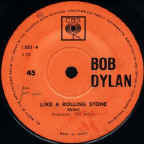 CBS 1.833 (Israel) - A-side scan by Hans Seegers (1965) |
Although most Dylan albums were released in Israel,
there were surprisingly only two Dylan 7" singles - Like A Rolling
Stone/Gates Of Eden in 1965, and Lay, Lady, Lay/Peggy Day in 1969. The 1965
single did not have a picture sleeve. Also of interest from Israel is a fake monochrome "promo" sleeve of Desire, with text in Hebrew, see Questionable Recordings. In fact the record was genuine but the sleeve was a fake, produced in Germany in the 1990s. Promo copies issued by CBS in Israel were just the regular albums with promo stickers as shown. |
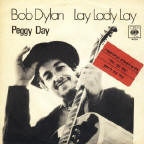 CBS 4434 (Israel) - front with promo stamp, scan by Hans Seegers (1969) |
|
 CBS 86003 (Israel) - genuine promo sleeve front with sticker, scan by Manuel García Jara |

Detail of inside of
official Megastar cassette inserts, scan by Manuel García Jara

Megastar cassette leader
tape scan by Manuel García Jara
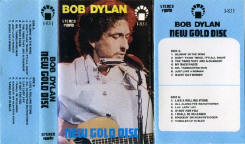 IMD-831 (Saudi Arabia, 1975) - outside of cassette insert, scan by Tom Willems (unofficial) |
These Footprint and IMD cassettes are unauthorised but were legal in Saudi Arabia at the time of release. They are all listed here. Despite the title Bob Dylan's Greatest Hits Vol. I on the front of the insert and the cassette sides, IMD-6011 is actually Record 1 of the 1971 double album Bob Dylan's Greatest Hits Vol. II. It has the correct picture on the front! |
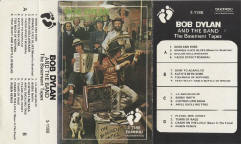 Footprint S-118B (Saudi Arabia, 1975) - outside of cassette insert, can by Ger Hemel |
|
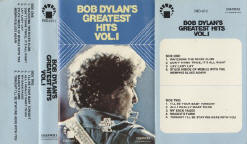 IMD-6011 (Saudi Arabia, mid-1970s) - outside of cassette insert, scan by Ger Hemel (unofficial) |
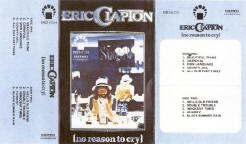 IMD-6324 (Saudi Arabia, 1976) - outside of cassette insert, photocopy by Paul Shenton (unofficial) |
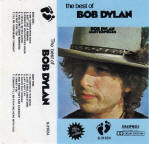 Footprint S-3102A (Saudi Arabia, 1978) - cassette insert scan by Dag Braathen (unofficial) |
|
|
IMD-6395 (Saudi Arabia, 1978) - outside of cassette insert, photocopy by Paul Shenton (unofficial) |
|
|
|
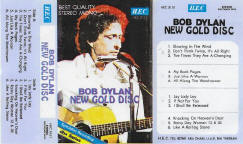 H.E.C. HEC 5151 (Abu Dhabi) - outside of cassette insert, photocopy by Paul Shenton |
This pirated cassette from Abu Dhabi, capital of the United Arab Emirates, is an unauthorised release of the 1975 CBS/Sony Japan compilation, see International Compilations (Dylan-only) 1970s. I don't have any official releases from this country! |
INDIAN SUB-CONTINENT
Singles:
The two CBS mono test pressings date from 1966. As far as I know, no single was released commercially in India in 1966.
The 7" singles with unique black CBS labels with silver text were manufactured and distributed in India for CBS Records by The Gramophone Company of India Limited, Dum Dum, India, part of the EMI group (bought by Universal in 2012). All five commercial singles shown have the equivalent US catalogue number. Both the red/white and turquoise/black Gramophone Company sleeves were used for the 1969 Lay, Lady, Lay single. The purple/white sleeve from "Symphony Salon" of Bombay was used for the 1970 Wigwam single, the buff CBS sleeve was used for the George Jackson single. The 1974 Asylum single was also made in India by The Gramophone Company of India, Ltd.
Albums:
The 1967-71 albums shown here were manufactured and distributed in India for CBS Records by the Gramophone Company of India Limited, Dum Dum, India, part of the EMI group, as was Planet Waves for the Asylum label.
The 1980s albums were made by CBS Gramophone Records & Tapes (India) Ltd. in Bombay [Mumbai]. The 1992 Good As I Been To You cassette was manufactured and marketed by Pan Music of Bombay on behalf of Columbia/Sony.
The 1997 Time Out of Mind cassette release and the subsequent releases were made by Sony Music India. The 2007 3CD set Definitive Collection contains Blonde On Blonde (CGK 00841), The Times They Are A-Changin' (CK 08905) and Desire (CK 33893).
FAR EAST
Thanks to Hans Seegers for all the exclusive CBS Japanese releases, etc.! Hans reminds collectors that the obi is an essential part of a Japanese rarity, especially since they are easy to lose. It is therefore best not to buy a Japanese album that is without its obi, unless you are desperate for the material, or the price is very low.
Japanese year numbers are confusing to Westerners as Wil
Gielen explained in 2008 about a 1965 Japanese promo LP: The white labels
have a very small date ("40 - 12") hand-stamped on each side - the “40” is the
Japanese year "Showa 40" (40th year of the reign of the Emperor Showa - Hirohito)
which corresponds to 1965 in the Western calendar. The "12" on the label is
for December. It's interesting that even now Japan uses its own system for
calendar years, and each ends when the Emperor dies, and starts again when the
new Emperor is announced. The current Emperor was crowned in 1988 and so that
was "Year Zero" for his era (the Heisei era), and now we are in year "Heisei 20"
(2008). This is used on newspapers, official documents, application forms,
birthdays etc (but not on CD release dates) more often than our Western 2008
year. It's very confusing for non-Japanese, because you need also to know the
era and the year to identify the correct year."
A 1977 Japanese release dated "52-12-31" meant 31 Dec 1977 as 1977 was Showa Era
Year 52 and a 1979 Japanese release was dated "54-1-12", Showa Era 54, so the date is
12 Jan 1979.
Thanks to Sheiji Murata for details of the year date codes used on Japanese LP and CD releases from 1984 up to Aug 1991. The code is in the form "Y-MM-DD", where "Y" is a letter from the name "NIHON RECORD KYOUKAI" (Japan Records Association). The sequence is N-I-H-O-(N)-R-E-C-(O)-(R)-D: "N"=1984, "I"=1985, "H"=1986, "O"=1987, "R"=1988, "E"=1989, "C"=1990, "D"=1991 (up to Aug). Therefore on Before The Flood the code "H-11-1" means "1 Nov 1986", on Bob Dylan's Greatest Hits, "O-8-26" means 28 Aug 1987, on Highway 61 Revisited "C-6-1" means 1 Jun 1990, etc.
Japan introduced sales tax in 1989. Before that an obi showed one price only and CBS/Sony catalogue numbers indicated the price, e.g. "25DP" meant ¥2,500. After the introduction of sales tax the obi showed both the price before and including tax and new systems of catalogue numbers were used.
Japanese Mono Singles (CBS):
Bob's first Japanese single, CBS LL-764-C, released in 1965, was re-released in 2020 as Sony Music SIKP-1002 (see below).
Japanese Stereo Singles and EPs (CBS):
| The later CBS "LSS" EPs released by CBS/Nippon Columbia in the "Stereo Seven" series were in stereo, as was the "Mascot 7" single. |
Japanese Stereo Singles and EPs (CBS/Sony):
CBS/Sony singles and EPs, all stereo, were released from 1968.
CBS/Sony SOPD 51-63 were stereo EPs all released in 1974 to promote the re-release of all Bob's albums in Japan. The three Asylum singles are also from 1974. SOPB 307 was the first Dylan single back on the CBS/Sony label in 1975. Mr. D's Collection #2 from 1976 was a limited edition EP with rarities!
Sony Music SIKP-1 from 2019 was the first Japanese vinyl single since the 1980s! The sleeve of 2020's mono SIKP-1002 is a reproduction of the Bob's first Japanese single, CBS LL-764-C, released in 1965 (see above).
Japanese Releases of Regular Dylan Albums:
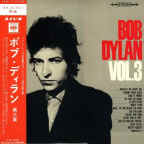 CBS YS-611-C (Japan) - front with obi, scan by Hans Seegers (Bob Dylan with reordered tracks) |
No mono Bob Dylan albums were released in Japan. Bob Dylan Vols. 1 and 2 were exclusive compilations, see below. |
 CBS YS-641-C (Japan) - front with obi, scan by Hans Seegers (The Times They Are A-Changin') |
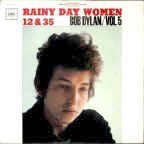 CBS YS-672-C (Japan) - front scan by Hans Seegers (Record 1 of Blonde On Blonde - this copy is missing its obi) |
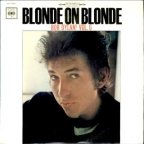 CBS YS-748-C (Japan) - front scan by Hans Seegers (Record 2 of Blonde On Blonde - this copy is missing its obi) |
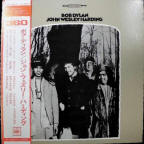 CBS YS-948-C (Japan) - front with obi, picture from www.discogs.com (1968 release) |
Bob Dylan Vol. 3 (CBS YS-611-C) was the 1962 Bob Dylan album with the tracks reordered, Bob Dylan Vol. 4 (CBS YS-641-C) was the 1964 The Times They Are A-Changin' album, while Bob Dylan Vols. 5 and 6 are the two records of Blonde On Blonde. John Wesley Harding (CBS YS-948-C) was the last Japanese CBS release before Sony took over the company, and is the only Japanese CBS release that uses the regular front sleeve! I have not listed the CBS/Sony onwards stereo releases of Bob's regular albums, but all are very high quality pressings with beautiful obis and exclusive Japanese booklets.
Vinyl Dylan Compilations Exclusive to Japan:
CD Dylan Compilations Exclusive to Japan:
|
|
Sony in Japan has also released several Dylan compilations on CD exclusive to Japan, including Dylan Ga Rock and Mr. D's Collection #3 in 1993, both with rarities. Many have exclusive artwork by Japanese cartoonist and long-time Dylan fan Jun Miura. Bob Dylan Live 1961-2000: Thirty-Nine Years Of Great Concert Performances from 2001 is an exclusive collection of live tracks including many rarities. Sony Music SICP 31623~4 is being released to coincide with Bob's Spring 2023 tour of Japan. The Japanese title is Ryuukoukashuu [流行歌集] meaning Collection Of His Hits. |
||||
|
|
|
Sony Records SRCS 2305 (Japan) - front with obi, scan by Sonny Boy McFitzson |
|
|
|
|
|
|
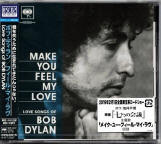 Sony Music SICP 31227 (Japan) - front with obi and sticker, scan by Jack from Canada |
|
 Sony Music SICP 31361~2 (Japan) - front with obi and tour sticker, scan by Sonny Boy McFitzson (revised design) |
 Sony Music SICP 31623~4 (Japan) - front scan by Sonny Boy McFitzson |
Vinyl Various Artists Compilations Exclusive to Japan (Nippon Columbia and CBS):
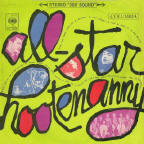 Nippon Columbia YS 320 (Japan, 1964) - front scan by Manuel García Jara |
These stereo compilations date from before Sony took over CBS in 1968. I haven't listed Various Artists compilations from CBS/Sony or Sony Music from after 1968 because there are far too many. |
 CBS YS-527-C (Japan, 1965) - front scan by Hans Seegers |
|||
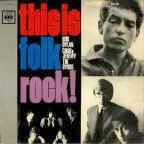 CBS YS-579-C (Japan, 1966) - front scan by Hans Seegers |
 CBS YS-608-C (Japan, 1966) - front with obi, picture from eBay |
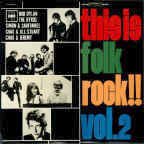 CBS YS-665-C (Japan, 1966) - front scan by Hans Seegers |
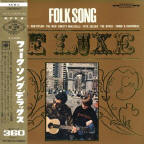 CBS XS-8-C (Japan, 1966) - front with obi, scan by Hans Seegers |
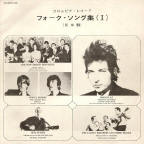 Nippon Columbia PH-3019~20 (Japan, 1966) - front of gatefold sleeve, scan by Manuel García Jara |
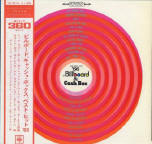 CBS YS-707-C (Japan, 1966) - front with obi, picture from www.jauce.com |
Japanese Promo and Commercial Cassettes (CBS/Sony, Sony Records, SME Records):
Other CBS/Sony Japan cassette releases known for
which scans are required are:
The
Freewheelin' Bob Dylan 25KP 242, 1976
The
Times They Are A-Changin' 25KP 243, 1976
Highway 61 Revisited 25KP 244, 1976
Desire 25KP 246, 1976 (25KP 245?)
Hard Rain 25KP 247, 1976
Slow Train Coming 25KP 475, 1979
Saved 25KP 581, 1980
These six Sony Records/SME Records Japan promo cassettes date from 1997 to 2001, and as far as I know there were no corresponding commercial cassette releases.
Japanese Singles Collection/60 Dylan
 Sony Music SICP-31361~2 (Japan) - Amazon Japan poster scan by Colin Hindson (2020) |
 Original 1857 artwork by Hiroshige Utagawa, picture from Fine Art America |
 "60 Dylan" postcard 3, picture frpm Otonano Portal web-site (2022) |
 Original 1858 artwork by Hiroshige Utagawa, picture from www.ukiyo-e.org |
The front design for The Japanese Singles Collection (Sony Music Japan, 2020) is based on artwork by Japanese Ukiyo-e artist Hokusai, namely his "Thirty-six Views of Mount Fuji" and "The Great Wave off Kanagawa". The picture also incorporates the image of Bob and Suze Rotolo from The Freewheelin' Bob Dylan with traditional Japanese Sugegasa straw hats!
In 2022 Sony Music Japan issued 60th Anniversary postcards commemorating Bob's debut on Columbia Records. The "60 Dylan" pictures are based on works by another Ukiyo-e artist Hiroshige Utagawa (spot the image of Bob and Suze in each picture). The Japanese script says "60 years since his debut album was released" (19 Mar 1962 in the USA, although not until 1966 in Japan). The first Utagawa picture is called "Sudden Shower over Shin-Ohashi Bridge and Atake" and dates from 1857. The second picture is called "Otsuki fields in Kai Province" and dates from 1858.
CDs Imported Into Japan
All but one of these albums were imported into Japan from the USA and sold with an obi, mostly by the Shinseido record store chain. The obi was added by the store to these import US copies (which were much cheaper than Japanese releases) to provide buyers with information in Japanese.
Wil Gielen has two copies of the US CD release of The Freewheelin' Bob Dylan imported into Japan, one with an obi from the Shinseido record store chain, and one with a different obi from an unknown company. Wil Gielen also has a mid 1990s copy of the US CD release of Blonde On Blonde imported into Japan with an obi from the Tsutaya Records rental store chain.
The copy of Nanci Griffith's Other Voices, Other Rooms (which includes Bob playing on Nanci's version of Boots Of Spanish Leather) sold in Japan is the 1993 Elektra German release with a wrap-around obi made by the Japanese record label Omagatoki (Dusk). Omagatoki was a subsidiary label of the Japanese record store chain Shinseido.
Hup Hup Records in Malaysia and its associated company Life Records in Singapore and Hong Kong were the first regional licensees for foreign labels such as CBS, MCA and KAPP in South East Asia in the 1960s and 1970s. Records manufactured in Singapore were distributed in Malaysia through Hup Hup Records' own Music City store chain. (In the 1960s/1970s each record company had its own record store chain in Malaysia, Hup Hup had Music City, EMI had Music Scene, Decca had Decca Orient, and Phonogram (Philips, Vertigo, Fontana, etc.) had Musicorner.) Hup Hup Records continued issuing CBS and later CBS/Sony records in Malaysia until the mid 1970s, when they lost the CBS licence to EMI Malaysia/Singapore, who produced CBS/Sony titles with the orange/cream record labels such as The Basement Tapes, but in turn lost their license when CBS Malaysia was set up. CBS Malaysia manufactured cassettes locally but imported LPs, so Bob Dylan records were no longer made in Malaysia or Singapore.
Hans: "Yes, there was already in 1967 a CBS pressing plant in Singapore. The LPs were made in Singapore and they bought the hard covers from the USA. They used the USA labels as an example, but with the CBS logos."
Manuel: "I have a good contact in Singapore: he is owner of a record shop, also on eBay (Poor Cow Vinyls). He says all vinyls released in Malaysia/Singapore till 1975 were made in USA (albums and singles), but record labels and sleeves were made in these countries under license of Columbia. Records made in USA or Canada for export to European countries (Switzerland or Scandinavia) for legal reasons have the Columbia logos hidden by CBS stickers on sleeve and or labels. But records made in USA for export to Malaysia/Singapore have printed from factory three CBS logos on labels and CBS logo printed on the sleeve (see the copy of John Wesley Harding sent by Gerd Rundel: it is actually made for exportation to Malaysia/Singapore). My contact says it is because labels and sleeves were made in these countries imitating the US model. Since 1975, Malaysia and Singapore have their own editions, made by EMI for CBS/Sony: Blood On The Tracks is noticeable in that this album was the last record made in USA for export to Singapore , while Malaysia had its own edition and a few months after EMI did a same edition (blue sleeve) for both countries. The Basement Tapes was the first Dylan album released in Malaysia/Singapore entirely made in those countries, without a version "made in USA".
The CBS albums were manufactured for CBS/Sony jointly in Singapore by EMI (Singapore) PTE. and in Malaysia by EMI (Malaysia) SDN. BHD. The RSO album was jointly manufactured by PolyGram Records Ltd. (Hong Kong), PolyGram Records Private Ltd. (Singapore) and PolyGram Records Sdn. Bhd. (Malaysia). The RSO tape has a price for West Malaysia (the Malayan Peninsula on the mainland of South East Asia) of $8.50.
The cassette release of Oh Mercy was manufactured by King's of Indonesia and uses the CBS logo on both the insert and the cassette itself, which looks like a recordable cassette rather than pre-recorded. It may therefore be unofficial. The cassette release of The Traveling Wilburys Vol. Three was manufactured and sold in Indonesia by PT. Aquarius Musikindo on behalf of Wilbury Records/Warner Bros. I haven't yet been notified of an Indonesian release of The Traveling Wilburys Vol. One. The official release of "Love And Theft" with the American catalogue number was manufactured by PT Sony Music Entertainment Indonesia. As far as I know this is the only worldwide commercial release of Modern Times on cassette. It is an official Sony BMG release and was made in Indonesia.
Mareco Inc. (1965-70, 1974):
The commercial singles have unique green labels. CBS 4-43477 is unusual in that the promo single has Highway 61 Revisited as the A-side, but the commercial single has Can You Please Crawl Out Your Window? as the A-side as expected.
The LP sleeves are based on the US sleeves with Columbia logos (although some have CBS on the rear). The records all have CBS labels. The Best Of '66 Volume One compilation shown has an imported US Columbia sleeve although the record has orange CBS labels.
Blackgold Records Corporation (1970-81):
Some expected albums like Blood On the Tracks and Desire are missing, and I don't have details of any Blackgold singles.
OctoArts International Inc. (1983-89):
PEOPLE'S REPUBLIC OF CHINA (CHINA)
 Haishan Records/Columbia HS 505 (Taiwan) - front scan by Manuel García Jara |
Although there are very many pirated Dylan albums from Taiwan, there were very few official Dylan releases. The two official albums from 1967 were made by Haishan Records of Taiwan on behalf of Columbia Records and are Records 1 and 2 of the 1966 Japanese CBS 2LP compilation The Bob Dylan Story. For several unofficial Taiwanese releases of official Dylan albums, see Questionable Releases. |
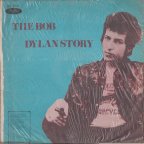 Haishan Records/Columbia HS 506 (Taiwan) - front picture from www.collectorsfrenzy.com |
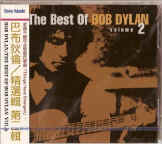 Sony Music COL 498361 2 (Taiwan) - front with obi, scan by John Gaylor (2000) |


HONG KONG (up to 1997) HONG KONG
(1997 onwards)
REPUBLIC OF KOREA (SOUTH KOREA)
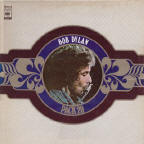 CBS/Sony/Jigu Records KJPL-0045 (South Korea) - front scan by Lars M. Banke (1975) |
There was a 1973 unofficial 7" single (Yegrin D-5) with Can't Help Falling In Love from the 1973 Columbia album Dylan (R-0100, see 1973). |
|
|
|
|
|
|
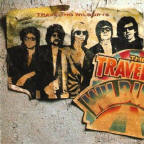 Wilbury Records/Warner Brothers 9 25796-2 (South Korea) - CD front scan by John Gaylor (1988) |
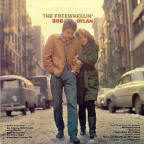 CBS/Sony/Jigu Records KJPL-0596 (South Korea) - LP front scan by Patrick Helfrich (1988) |
|
|
|
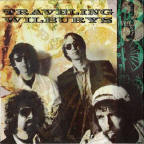 Warner Bros/Oasis Records 7599-26324-1 (South Korea) - LP front scan by Patrick Helfrich (1990) |
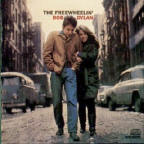 Columbia/Jigu Records CPL-1142 (South Korea) - CD front scan by Hans Seegers (1991) |
 Sony/Columbia CK 9463/DPL-5011 (South Korea) - LP front scan by Lars M. Banke |
 Sony/Columbia CK 9463/DPK-5011 (South Korea) - front of CD slipcase, picture from www.discogs.com |
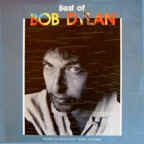 Han Su Li Records MHLR-1058 (South Korea) - photograph by Ulf Gyllenspetz (1991) |
 Epic/Legacy/Sony Music Soundtrax E2K 215090 (South Korea) - front scan by Manuel García Jara (1994) |
 Epic Soundtrax EK 217773 (South Korea) - front scan by Manuel García Jara (1996) |
 Columbia COL OPE-2289 498361 2 (South Korea) - front scan by Manuel García Jara (2000) |
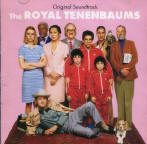 Hollywood Records 806581-226478 (South Korea) - front scan by Manuel García Jara (2001) |
 Reprise 93624 81092 (South Korea) - front scan by Manuel García Jara (2001) |
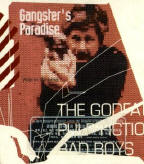 Sony Music CP2K 2745/510828 2 (South Korea) - front scan by Manuel García Jara (2002) |
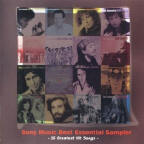 Sony Music PROM 123 (South Korea) - front scan by Hans Seegers (2002) |
 Epic/Sony Music Soundtrax EK 227840 (South Korea) - front scan by Manuel García Jara (2002) |
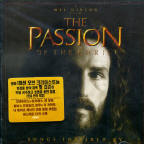 Universal South DW 8832/986 231-5 (South Korea) - front with sticker, scan by Manuel García Jara (2004) |
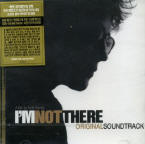 Sony Music Soundtrax S810353C (South Korea) - CD front with sticker, scan by Manuel García Jara (2007) |
Columbia 51055BC/88697438932 (South Korea) - front with sticker, scan by Jens Winter (2009) |
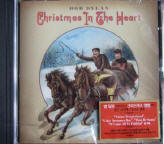 Columbia S10623C/88697573232 (South Korea) - front with sticker, scan by Jens Winter (2009) |
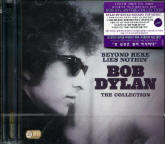 Camden Deluxe/Sony Music/Legacy S30762C/88697983862 (South Korea) - front with sticker, scan by Manuel García Jara (2010) |
From the 1970s up to 1991 Jigu Records released records and tapes in South Korea on behalf of CBS/Sony Japan.
The 1988 South Korean CD release of The Traveling Wilburys Volume One was manufactured by SKC Limited on behalf of Warner Bros/Wilbury Records. The rare 1990 The Traveling Wilburys Volume Three South Korean vinyl LP was distributed by Oasis Records on behalf of Warner Bros/Wilbury Records.
The 1991 LP and CD releases of The Greatest Hits Of The Superstars 11/Bob Dylan's Greatest Hits were manufactured in South Korea by Seoul Records Inc. The 1991 CD release of The Freewheelin' Bob Dylan was manufactured in South Korea by SKC Limited.
As far as I know there have been no Dylan releases from North Korea.
AUSTRALASIA
Early Australian release record labels had the text "MADE IN AUSTRALIA BY A REGISTERED USER OF THE TRADE MARKS" without a CBS copyright. This is because up to 1977 all Australian records were manufactured by the Australian Record Company (Pty) Ltd. (A.R.C.) on behalf of CBS. A.R.C. changed its name to CBS Records Australia Limited on 17 Oct 1977, and on record labels from after that date the longer bottom edge text includes the CBS copyright information. (Stuart Moore says that the label change may not have occurred till late 1978 or early 1979, Bob Dylan At Budokan from 1978 still does not have a CBS copyright nor does Masterpieces, Slow Train Coming from 1979 does have the CBS copyright.)
|
|
Gold Series CD Releases
New Zealand releases have the text "MADE IN NZ BY A REGISTERED USER OF THE TRADEMARKS". The CBS and Epic record labels were manufactured and distributed in New Zealand by Phonogram (part of the Philips group, now Universal), who were the registered user. Records were pressed at the Phonogram/Polydor plant in Miramar, a suburb of Wellington.
The sleeve of the New Zealand release of Bringing It All Back Home was the only one printed by Coulls Somerville Wilkie (CSW), used for mono and stereo; there was also a later stereo release of this album (1974) but the sleeve was printed by Phonogram. Some other NZ sleeves were printed by Whitcombe & Tombs; in the 1970s both companies merged and became Whitcoulls. Also, some other New Zealand sleeves were printed by Cello-Kraft.
Phoenix C says:
Just wanted to send some more information concerning Bob Dylan and CBS releases here in New Zealand. I had learned quite a bit more on New Zealand pressings since I last emailed, hopefully the new info will help with New Zealand pressings. This is what I know and have seen from a whole year of cataloguing New Zealand pressings of many albums, but I can still be wrong. I have noticed that in 1972, CBS still continued issuing albums (such as Paul Simon's 1972 self-titled album) as fully laminated sleeves with two folded-over flaps such as the 1974 Freewheelin' stereo release, and pressed with "deep-grooved" labels such as the label picture shows (below second left):
However, CBS changed their pressing practices possibly later in the year. They were still issuing fully laminated sleeves with two folded-over flaps but the labels were now pressed with ridges around the circumference of the label as seen with the later version of Paul Simon's album (above third left).
I believe it remained like this during the remainder of 1972 since Santana's 1972 album and the 1972 Simon & Garfunkel compilation album were released, with similarly-made sleeves and similarly-pressed labels. The cover manufacturing style would change sometime in 1973. It was sometime in 1973 when sleeves were now issued without flaps, although still fully laminated with the way the label was pressed remaining the same until the mid-1980s and the orange label remaining until 1975, with the "sunburst" label style being first used sometime in 1976. I've only ever seen Dylan albums (from his first to Blonde On Blonde) issued in fully laminated sleeves without flaps (such as the one above second right) although I'm not sure about his albums following John Wesley Harding.
Then sometime in 1974 (presumably the year these Dylan stereo versions were being issued), the "marketed by Phonogram" logo started appearing on CBS covers. I agree with the info from the website that these stereo Dylan issues were issued around 1974-1975, although I think 1974 is more correct since I noticed laminated sleeves weren't being made any more from 1975 and onwards (as was with Blood On The Tracks, along with other 1975 CBS albums). These versions of Dylan's album could not have been released in 1973 since CBS sleeves did not feature the "Phonogram" logo on them until 1974, which makes 1974 to be the most verified year. These Dylan albums also had "XSM" catalogue numbers on the label.
CARIBBEAN

BARBADOS up to 1966 BARBADOS
after 1966
Asylum releases:
Before The Flood comes in a standard Asylum US gatefold sleeve with a sticker saying that the records were made in Barbados. The records have white Asylum labels with "Made in Barbados" stamped on Sides 2 and 4.
A&M release:
The only other album I have from Barbados so far is the 1973 A&M release of Chronicles by Booker T and Priscilla Jones, with Bob playing harmonica on The Crippled Crow. (R-0094, see 1973. This album has what look like the US outer and inner sleeves, with only a small sticker on the rear sleeve with the text "WIRL" (West Indies Records Limited as above) and the company logo (same as on the Asylum release sleeve). The record was pressed in Barbados and the A&M record labels have "Made in Barbados" printed in a white panel on both sides.
The 1969/1970 singles were manufactured and distributed by Record Specialists Ltd., Kingston, Jamaica, whose name appears at the top underneath the Columbia logo. Ger Hemel has a US copy of the 1973 Dylan album with a silver sticker on the rear sleeve with text “MADE IN KINGSTON, JAMAICA BY RECORD SPECIALISTS LTD”. This album may not actually have been made in Jamaica, but made in the USA and exported to Jamaica, where the sticker was affixed. Lars M. Banke has a copy of Nashville Skyline with the same silver sticker.
Michael Goodall has a copy of the stereo Highway 61 Revisited Columbia CS 9189 with a "MADE IN JAMAICA, W.I." sticker on the rear sleeve. Again, this album was almost certainly actually made in the USA and exported to Jamaica.
The 1970 Wigwam single exists as a test pressing from Record Specialists Ltd. as well as a promo release with white labels and commercial releases with orange, red and yellow labels!
The 1985 single by USA for Africa has poorly printed black text, most of which looks typewritten. The bottom text says "MFG. UNDER LICENCE BY DYNAMO SOUNDS 15 BELL ROAD KGN JA". "KGN JA" is Kingston, Jamaica.
CENTRAL AND SOUTH AMERICA
Manuel García Jara's information on Dylan albums in Latin American countries:
Bob Dylan was released only in Brazil but in a later stereo edition in the 1980s by Harmony (a CBS budget label).
The Freewheelin' Bob Dylan, The Times They Are A-Changin' and Another Side Of Bob Dylan were never released there!
Bringing It All Back Home was released only in Brazil and there only as a mono album, never reissued in stereo.
Highway 61 Revisited was released only in Mexico (mono and stereo), Brazil (originally in mono and later released in stereo in the late 1970s) and Uruguay (mono).
Blonde On Blonde is still unreleased there!
Amazingly Bob Dylan's Greatest Hits was only released in Mexico (mono and stereo) but not in Brazil and it was only released for the first time in Argentina and Uruguay until 1977!
John Wesley Harding was only released in Colombia!
Nashville Skyline had a "massive" release only after the success of the single "Lay Lady Lay" (Mexico, Brazil, Uruguay, and it was the first Dylan album released in Argentina and Chile).
Self Portrait was released as a single album (record #2) in Mexico and Peru (the only Dylan album released there) and in its original format only in Brazil.
New Morning was only released in Brazil (mono) and in Uruguay (stereo).
Bob Dylan's Greatest Hits Vol. II was never released there: some Latin American countries had exclusive compilations (Poeta O Profeta in Argentina and Uruguay, Greatest Hits, two different versions, 1970 and 1975, in Brazil, or Los Más Grandes Éxitos in Venezuela).
Pat Garrett & Billy The Kid was unreleased there at the time and belatedly released in the early 1980s only in Brazil and in Argentina.
Dylan (1973) was released only in Brazil.
Asylum Records had a different way of working and Planet Waves was released in most Latin American countries (Mexico, Colombia, Venezuela, Brazil, Argentina, Uruguay and Chile) but Before The Flood only in Mexico, Brazil, Colombia, Venezuela and Argentina.
Back to
CBS and back to scarce editions: Blood On The Tracks
was released only in Brazil and Argentina and The Basement
Tapes was never released in any Latin
American country.
After the success of Desire
in the USA, things got better and from 1976 to the mid 1980s each new Dylan
album was released in Mexico, Colombia, Venezuela, Brazil and Argentina but not
in Uruguay (with the exception of Street Legal) and
there were even some great surprises (records released in Costa Rica or the
Dominican Republic).
From the mid 1980s, CBS was closing its offices one by one in those countries (like in the rest of the world) although some Dylan albums were still released in Argentina (the last was Under The Red Sky) and Brazil (World Gone Wrong was their last album).
"Disco es cultura [Record is Culture]" is usually printed on records made in Latin American countries: this seems obvious because a record is definitely a cultural item, but in Spain and in these Latin American countries book publishers pay less Government taxes than record companies, so the price of records are more expensive there than in other countries; for this reason "Disco es cultura" is a protest slogan!
Some translations of Dylan song titles into Spanish, especially in Latin American countries, are very eccentric!
All releases in Mexico have song titles translated in Spanish (usually correctly) and were made by Discos CBS, Mexico City, unless otherwise stated. CBS CLS-463764 (Mexico) in 1990, which is actually a reissue of the 1967 compilation Bob Dylan's Greatest Hits, appears to be the last vinyl album released there. Ironically, some US CD releases have discs made in Mexico.
Singles and EPs
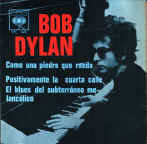 CBS EPC 496 (Mexico, mono) - front of folded card sleeve (my copy, 1965) |
These singles are stereo unless listed as mono. En Una Noche Como Esta [On A Night Like This]/Tú Ángel Tú [You Angel You] was made in Mexico by Gamma S.A. for Asylum Records (Gamma is a Mexican label, well known to Dylan covers collectors). |
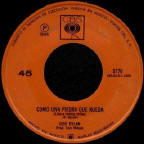 CBS 5770 (Mexico, mono) - A-side scan by Hans Seegers (1965) |
|||
|
|
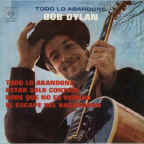 CBS EPC 945 (Mexico, mono) - front scan by Hans Seegers (1969) |
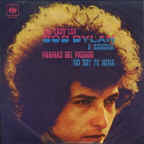 CBS EPC 978 (Mexico, mono) - front scan by Hans Seegers (1969) |
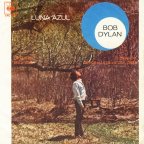 CBS EPC 1018 (Mexico) - front scan by Hans Seegers (1970) |
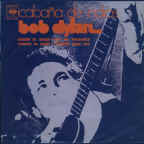 CBS EPC 1028 (Mexico) - front scan by Hans Seegers (1970) |
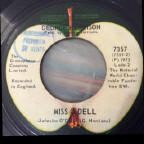 Apple 7357 (Mexico, stereo) - B-side with Bob possibly on harmonica, picture from www.discogs.com (1973) |
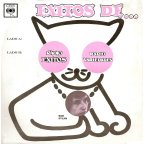 CBS 7184 (Mexico, stereo) - front scan by Manuel García Jara (1973) |
 CBS 7238 (Mexico) - A-side scan by Hans Seegers (1974) |
 Asylum/Gamma G-1328 (Mexico) - A-side scan by Manuel García Jara (1974) |
 CBS 7447 (Mexico) - A-side scan by Manuel García Jara (1975) |
CBS 45-7568 (Mexico) - front scan by Hans Seegers (1976) |
 CBS 7631 (Mexico) - A-side scan by Manuel García Jara (1976) |
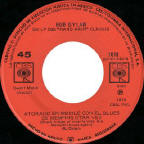 CBS 7818 (Mexico) - A-side scan by Manuel García Jara (1976) |
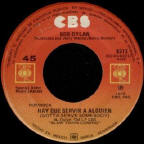 CBS 8213 (Mexico) - A-side scan by Hans Seegers (1979) |
 CBS 8648 (Mexico) - A-side photo from www.discogs.com (1985) |
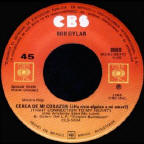 CBS 8669 (Mexico) - A-side scan by Ronald Born (1985) |
CBS PR-653204 (Mexico) - Side 1 (my copy, 1988, same both sides) |
|
Dylan Albums
Ondas Planetarias [Planet Waves] and Antes Del Diluvio [Before The Flood] were made by Gamma S.A. for Asylum Records.
Various Artists and Other Artist Albums
 CBS CL-5139 (Mexico, mono) - front scan by Manuel García Jara (1965) |
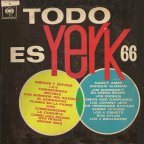 CBS DCA 444 (Mexico, mono) - front scan by Manuel García Jara (1966) |
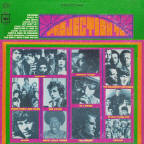 Columbia CLS 5292 (Mexico) - front scan by Manuel García Jara (1969) |
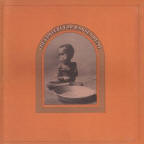 Apple STCX 3385 (Mexico) - front of box, scan by Manuel García Jara (1972) |
 CBS TVCLS 123 (Mexico) - front scan by Hans Seegers (1984) |
 Wilbury Records/Warner Bros LXWB-6787 (Mexico) - front scan by Manuel García Jara (1988) |
 Island 2LA.833 (Mexico) - front with sticker, scan found by Wil Gielen (1988) |
 Island/PolyGram LPR 25019 A2 (Mexico) - front scan found by Wil Gielen (1989) |
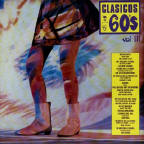 Okeh OKL-463771 (Mexico) - front scan by Hans Seegers (1989) |
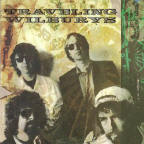 Wilbury Records/Warner Bros LPXB-7028 (Mexico) - LP front scan by Manuel García Jara (1990) |
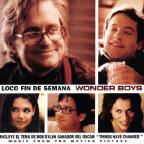 Columbia/Sony Music Soundtrax CDMI 497738 (Mexico) - scan by Hans Seegers (2000) |
 Sony Music 886919771923 (Mexico) - front picture from www.amazon.com (2012) |
These albums are stereo unless listed as mono.
Fake Mexican Record Sleeves
Unfortunately Mexico is plagued with rogue sellers on eBay and other auction sites who is getting away with selling genuine Mexican releases by Bob Dylan and other artists with fake picture sleeves! For example are copies of the Mexican Bob Dylan's Greatest Hits in fake promo sleeves. This record dates from the 1980s, but the right-hand sleeve previously turned up with a 1960s record! Another example is a Mexican release of Knocked Out Loaded in a fake promo sleeve with the hilarious title misspelling of "Kwocked Out Loaded"! It's a crock all right! You are advised not to buy anything from these rogue sellers who use many different names but whose offerings are unmistakeable! For fake Portuguese sleeves, see above.
These singles are listed in Questionable Releases (Official Dylan Singles).
Confusingly Dylan records were released in Argentina by CBS until Street Legal in 1978, in the period 1978-1982 (from Bob Dylan At Budokan to Shot Of Love) by Columbia, from 1983 to 1988 again by CBS, and from 1989 onwards again by Columbia.
Argentinean record labels have the logos of two copyright organisations:
“COMAR” [Corporación Musical Argentin a] is the “Argentinean Musical Corporation” (Corporación Musical Argentina). It was established in 1936.
"SADAIC" [Sociedad Argentina De Autores y (I) Compositores] is the "Argentinean Society of Authors and Composers", also established in 1936, the result of the merger between the "Asociación Argentina de Autores y Compositores de Música" [Argentinean Association of Authors and Composers of Music] and the "Círculo de Autores y Compositores de Música" [Circle of Authors and Composers of Music].
Argentinean translations of Dylan song titles into Spanish are possibly the most eccentric of all! My favourite is "Amor Submarino [Underwater Love]" for Watered-Down Love from Shot of Love. The title of Infidels was translated incorrectly as Infidelidades [Infidelities] instead of Infieles!
Sergio Mariano Romay found this quote about Argentinean Beatles mono albums which may also apply to Argentinean CBS Dylan mono albums:
"We must also bear in mind that the original MONO editions in Argentina are deceptive. There are no original MONO blends of Abbey Road or Let It Be. What was done in Argentina is something called "fold down mono" which consists of taking the STEREO master and processing it to reach a single channel (MONO). The same was done with records that do have original MONO mixes such as the White Album or Sgt. Pepper that, as Odeon Argentina did not receive the original MONO masters in time, processed the STEREO master as fold down. This makes the MONO Argentina editions a rarity, although it is not the only country where this happened ... there is also the Abbey Road Brazilian MONO, for example."
These very rare Bolivian single/EP releases are all I have so far from this country. The 1979 Bolivian single came in the generic sleeve shown. Bolivian releases were made by Industrias Fonoeléctricas Lyra of La Paz for CBS Records up to the mid 1970s, after which CBS records from Bolivia were made by another company, Heriba Ltda.
Thanks to Manuel García Jara and Hans Seegers for information and scans.
Mono LP releases:
Stereo LP releases:
Some albums, originally released in mono, were also released in the 1970s in stereo: they always have the original mono catalogue number starting with "1", e.g: Highway 61 Revisited: 37.457 (mono) and 137.457 (stereo); Bridge Over Troubled Waters (Simon & Garfunkel): 37.665 (mono) and 137.665 (stereo); Mr. Tambourine Man (The Byrds): "37.418" (mono) and "137.418" (stereo). However, the album Bridge Over Troubled Waters with a higher stereo catalogue number (because it was originally released in mono in 1970), was released in stereo (1972) before Highway 61 Revisited (1979); and Mr. Tambourine Man, originally issued in mono in 1965, has the lowest stereo catalogue number but it was not released in stereo until 1985. Highway 61 Revisited was not released in stereo until 1979 but its catalogue number is "137.457", lower than Blood On The Tracks (137.873).
The Discos CBS record labels of each album have a C.G.C. (tax) number for Discos CBS in a rectangle to the right of the centre hole. "C.G.C." means in Portuguese "Cadastro Geral de Contribuinte [General Taxpayer Registration]". Additionally, each song title listed on a Brazilian record label has a copyright code after it in brackets. As can be seen, Like A Rolling Stone is code "60559063" and the same number appears on all Brazilian record labels.
Surprisingly CBS Brazil never had its own pressing plant there until the late 1970s. All Dylan records until Blood On The Tracks were manufactured for CBS by RCA Electronica Ltda. CBS never had its own pressing plant in Brazil until late 1979 or early 1980s. From the 1960s until 1975, CBS records were manufactured by RCA Electronica Ltda. The last Dylan album made by this company was Blood On The Tracks. After RCA, there were several local companies:
1975-1977. Discos Copacabana (based in São Bernardo do Campo) . The first edition of Bob Dylan's Greatest Hits Vol. I in 1975 was the first (of three) Dylan albums manufactured by this Brazilian label. Records made by them for other companies have on the labels only "Som Indústria E Comercio S.A.". This company also made the first edition of Desire and Hard Rain.
1977. Gravaçôes Eléctricas S.A. (São Paulo). It was the manufacturer of the second edition of Desire and also the second edition of Bob Dylan's Greatest Hits Vol. 1.
1978. INA Nacional Discos Ltda. (São Paulo) It was property of WEA Brazil. This company made Street Legal only.
1978-1979. Tapecar Gravaçôes S.A. (Rio de Janeiro) Pressing plant owned by the label Tapecar Discos. This company made the first edition of Bob Dylan At Budokan (still with orange labels) and the stereo edition of Highway 61 Revisited.
1979. Gravaçôes Eléctricas Ltda. again. This time they just made Slow Train Coming.
Saved (1980) was the first Dylan album made by CBS in its own pressing plant in Rio de Janeiro!
|
As stated above, The Freewheelin' Bob Dylan, The Times They Are A-Changin', Another Side Of Bob Dylan, Blonde On Blonde and John Wesley Harding were not released in Brazil, The Basement Tapes was also omitted. Two Brazilian releases are of special merit:
|
Compilation Albums (Dylan-only):
All these Brazilian releases are exclusive to the country - the Greatest Hits album with the cover of Bob Dylan's Greatest Hits Vol. II is a single album with a unique tracklist. The list shown here may not be complete.
Compilation Albums (Various Artists):
Single Releases:
CD Releases:
There were only three Dylan vinyl albums and two singles released in Chile, and all are very rare.
Philips for CBS Records (1969):
Asfona for Asylum Records (1975):
EMI Odeón for CBS Records (1971, 1976):
CBS Records Chile Ltda (1986):
These are the only Peruvian releases with Bob I have so far.
The very rare 1970s Peruvian cassette release of Bob Dylan's Greatest Hits was distributed for CBS by Discos Independientes S.A,, Lima. Only Record 2 of Self Portrait was released in Peru.
The very rare 1972 Venezuelan George Jackson single was also sold in Peru.
The 1978 Peruvian release of The Last Waltz by The Band and Guests plus a 1989 promo EP containing a Traveling Wilbury track were released by Virrey Records on behalf of Warner Brothers.
Desire was never released in Peru. François Guillez has found what purports to be a promo copy in a red/white sleeve. The record has stained white labels with an unreadable promo stamp on Side 1. It may be a genuine copy of Desire from some other country with a fake label but I am sure the sleeve is entirely fake.
Manuel García Jara says: "CBS Peru used the same promotional sleeve in the 1970s and 1980s. I've got Peruvian promo copies of Wish You Were Here (Pink Floyd), released in 1975, and Born In The USA (Bruce Springsteen) from 1984 and the promo sleeve always remained the same. The front has a big CBS/Columbia logo and the text "PROMOCIONAL / PROHIBIDA SU VENTA" at bottom right, without any mention of artist or album title; the rear always is blank with the stamped text "PROMOCIÓN". The catalogue number SE-76003 (first European editions were CBS 86003) does not belong to Peruvian CBS albums. In the 1970s and 1980s the genuine catalogue number was "SE" plus a four-digit code (not a five-digit code), starting with "8.", My Peruvian copy of Wish You Were Here, released in 1975, is SE-8.385, Animals (Pink Floyd, 1978) is SE-8.398. Peruvian promo editions come with the commercial vinyl with stamped promo text, never a white label."
Uruguay albums and singles were released by Sondor S.A., Montevideo, on behalf of Columbia.
7" singles:
The other two rare Venezuelan singles have picture sleeves. The George Jackson single was also sold in Peru. Bob is rumoured to have played harmonica on Miss O'Dell, the B-side of the 1973 Apple George Harrison single. It didn't have a picture sleeve.
Regular Dylan Albums and Compilations:
Many Dylan albums were not released in Venezuela, these are the only albums I have so far. The two Asylum releases were made by Polydor S.A., Caracas, and have consecutive catalogue numbers, so were released at the same time.
Albums with Dylan:
 CBS CL-2370 (Venezuela) - front scan by Manuel García Jara (1966) with Like A Rolling Stone |
These are all the other artists or
various artist albums including Bob listed so far from Venezuela. Also released in Venezuela was Traveling Wilburys Volumen 1 (Wilbury/Sonografica 35 006L), 1988, scans to be added. |
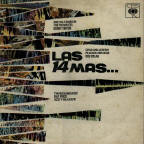 CBS CL-2543 (Venezuela) - front scan by Hans Seegers (1970) with I Want You |
 Apple STCX 3385 (Venezuela) - front of gatefold sleeve, scan by Manuel García Jara (1972 3LP set) |
||
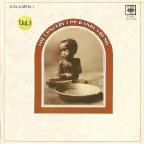 CBS CS-10.343 (Venezuela) - front scan by Manuel García Jara (1979 3 single LPs release - CS-10.343-345) |
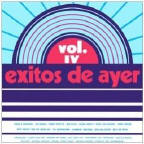 CBS CS-10.149 (Venezuela) - front picture from barraezo.blogspot.co.uk/ (1973) with Lay, Lady, Lay |
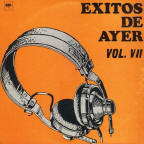 CBS CS-10.210 (Venezuela)- front scan by Hans Seegers (1976) with George Jackson |
 RSO MC-8013 (Venezuela)- outside of cassette insert, scan by Manuel García Jara (1976) with Bob on Sign Language |
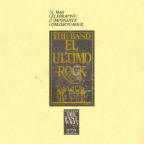 Warner Bros/Grabaciones Mundiales GM 200.2379-3 (Venezuela) - front of gatefold sleeve, scan by Manuel García Jara (1978) |
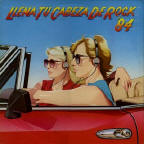 CBS CS-10-475 (Venezuela) - front scan by Hans Seegers (1984) with Neighbourhood Bully |
Thanks to Hans Seegers, Manuel García Jara, Gerd Rundel and Hans-Juergen Zollerg for information and scans.
AFRICA
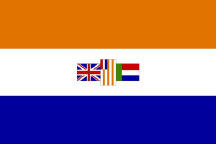
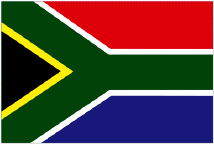
SOUTH AFRICA (1961-93)
SOUTH AFRICA (1994 onwards)
This is the chronological list of Dylan mono albums released in South Africa:
1965 - Bringing It All Back Home (CBS ALD 6801), The Times They Are A-Changin' (CBS ALD 6814), The Freewheelin' Bob Dylan (CBS ALD 6816), Bob Dylan (CBS ALD 6818)
1966 - Highway 61 Revisited (CBS ALD 6913), Blonde On Blonde (CBS ALD 6953-4)
1967 - Bob Dylan's Greatest Hits (CBS ALD 8035)
1968 - John Wesley Harding (CBS ALD 8124)

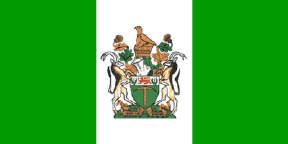
SOUTHERN RHODESIA (up to 1964) RHODESIA
(1965-79)
As far as I know, there were no Dylan releases in Southern Rhodesia before 1964.
Singles:
Albums:
Rhodesian sleeves from the 1960s are virtually identical to the South African sleeves except for the text "Made in S. Rhodesia" on a sticker; the Rhodesian sleeves of this period were also printed also by Record Pac or Interpak. From the late 1960s and the early 1970s Rhodesian sleeves were printed by a different company, Belmont Printers of Bulawayo: however, on some sleeves the Interpak logo is missing (Bob Dylan's Greatest Hits, Nashville Skyline), or almost deleted (Bob Dylan's Greatest Hits Vol. II) but the expected Belmont code "4-A" was not present. Blood On The Tracks is the earliest record so far found where this code is present. Belmont used codes starting with "4" on sleeves they printed for CBS Records, on sleeves they printed for other record companies they used different codes, e.g. "1" for PolyGram and "6" for Virgin.
There was a 1970 Rhodesian release of New Morning but I don't have it listed yet. I have no details of a Rhodesian release of 1973's Dylan. The promo Elektra/Teal Rhodesian release of Planet Waves is the only worldwide occurrence of this "negative" sleeve. The commercial release of the album was made by Warner Bros for Elektra Records and had a conventional sleeve. The South African Asylum release of Before The Flood by Bob Dylan and The Band was also sold in Rhodesia with different record labels, unusually for Rhodesia in two different designs. There were four different releases of Slow Train Coming in Rhodesia/Zimbabwe, the first two with orange/yellow CBS labels, the next two with white labels.
CBS Rhodesia used orange record labels almost identical to the South African labels from the 1960s until late 1976. From late 1976 until late 1980, CBS Rhodesia used white labels with blue text and the CBS logo in a box for commercial records, as can be seen for the original and second Rhodesian releases of Blood On The Tracks.. The sleeves had the codes of Belmont Printers of Bulawayo printed on the rear.

CBS ASF 3114 (Zimbabwe) - detail of rear, scan by Lars M. Banke ("GALLO/GRC"/"4A"/"Belmont
Printers")
Rhodesia/Zimbabwe Record Labels

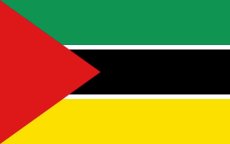
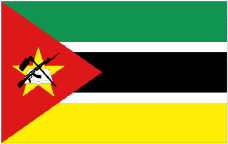
MOZAMBIQUE (Colonial) MOZAMBIQUE
(1974-75) MOZAMBIQUE (1975 onwards)
These are the only Dylan releases I have for Mozambique and all but the 1976 re-release of Planet Waves date from 1970-74 before independence. The Times They Are A-Changin', The Freewheelin' Bob Dylan, Highway 61 Revisited, Self Portrait and New Morning were produced and distributed in Mozambique by Companhia Ultramarina de Comércio, LDA, of Lourenço Marques (now Maputo). The 1974 release of Planet Waves was manufactured for Elektra Records by Teal Discos LDA, Lourenço Marques, and the record had Elektra labels. The 1976 release of Planet Waves was again manufactured by Teal Discos LDA, but now the city was called Maputo, and the record had Warner Bros labels.
The 1974 Elektra single of On A Night Like This and You Angel You from Planet Waves was also manufactured in Mozambique for Asylum Records by Teal Discos LDA.

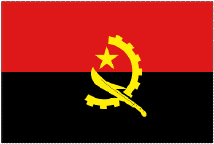
ANGOLA (Colonial)
ANGOLA (1975 onwards)
The former Portuguese colony of Angola also became independent in 1975. These are the only Dylan or Dylan-related releases I have for Angola and all date from 1969-74 before independence. The incredibly rare Dylan single of Lay, Lady,Lay, probably the rarest Bob Dylan single of all, was made for CBS Records by Valentin de Carvalho CI-SARL of Luanda, Angola, and has The Sounds Of Silence by Simon and Garfunkel as the A-side. It is the only known Angolan Dylan single release, see 1972. There was a 1969 mono acetate of Tonight I'll Be Staying Here With You/Country Pie from Nashville Skyline but I don't believe this was ever released commercially. The Roberta Flack Atlantic single has her cover of Just Like A Woman on the B-side and was manufactured for Atlantic Records by Teal Discos Roda LDA, Luanda. The Melanie Buddah Records single has her cover of Lay, Lady, Lay on the B-side and was manufactured for Buddah Records by Valentin de Carvalho CI-SARL, Luanda, who made the Lay, Lady, Lay Dylan single. The George Harrison single, where Bob possibly plays harmonica on the B-side Miss O'Dell was also made in Angola by Valentin de Carvalho CI-SARL.
The equally incredibly rare Planet Waves album was made by Discos Teal Roda in Angola for Elektra Records. The record has World Record Co labels with catalogue number EKC 6036 as for the other African releases. As far as I know, this was the only Dylan album released in Angola.
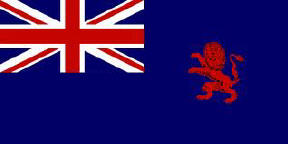
KENYA (Colonial)
KENYA (Dec 1963 onwards)
The 1978 Kenyan single of Baby Stop Crying/New Pony can be found with a PolyGram sleeve. Many records from different companies released in East Africa (Kenya, Uganda and Tanganyika/Tanzania) and later in Kenya were made in the pressing plant of PolyGram in Nairobi, Kenya. There must be more Kenyan singles!
Thanks to Hans Seegers and Manuel García Jara for information and scans.
[Home] [The Official
Rarities Yearly Lists] [Traveling Wilburys]
[Online Performances (bobdylan.com)] [Online Performances (Other)] [Interviews with Bob] [VHS
& DVD]
[International Mono Releases] [International Stereo Releases]
[Questionable
Releases] [Released Rarities] [Honourable
Mentions]
[News] [Red Herrings] [Trading] [Other Pages]

A Flying Pig production
Listings ©
1998-2024
The rights to material from all quoted contributors remain
with them.
Copyright of all included artwork remains with the various record
and audiovisual companies and artists.
The previous Web Counter has now been discontinued. There have been around 12 million visits since mid-1998. New statistics from end Jun 2022 are here.